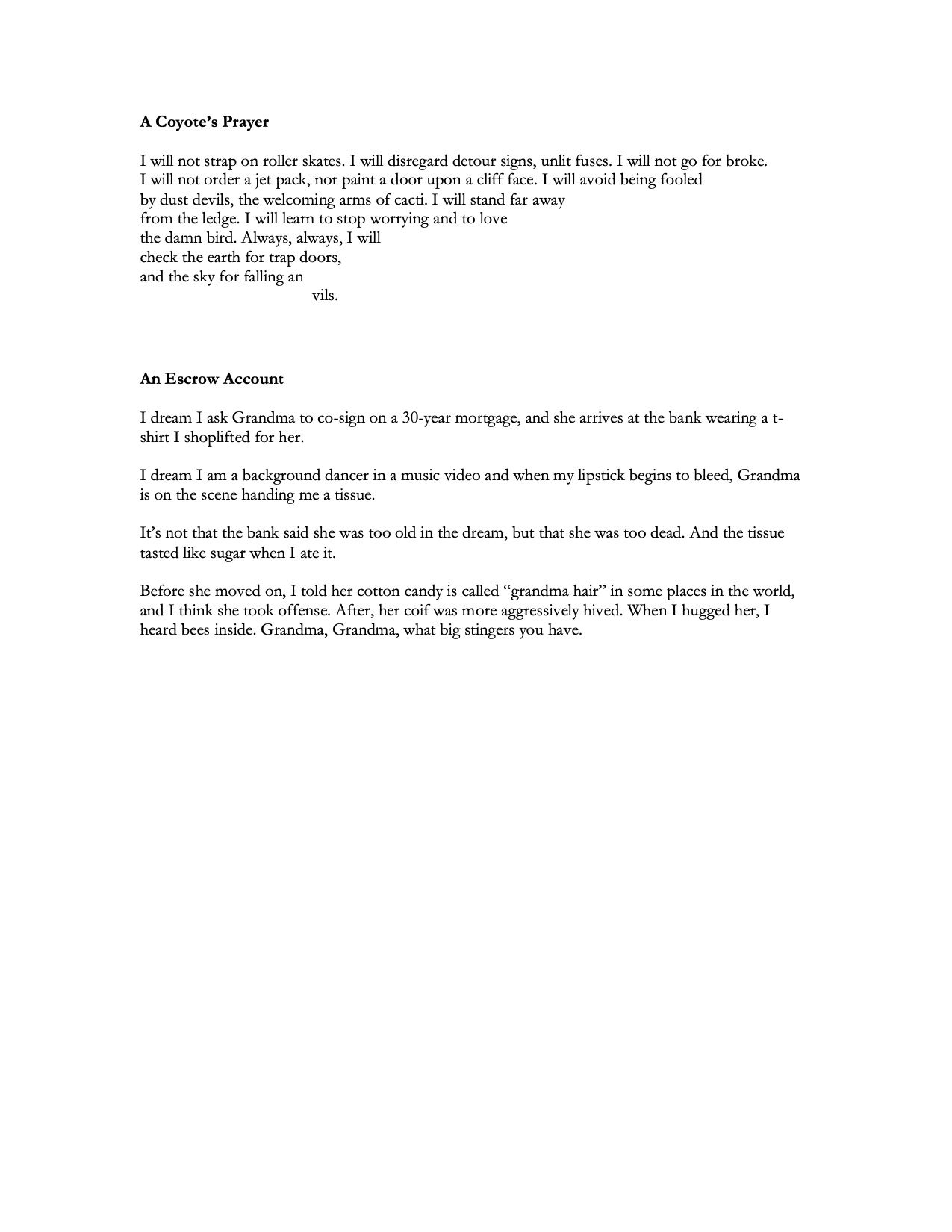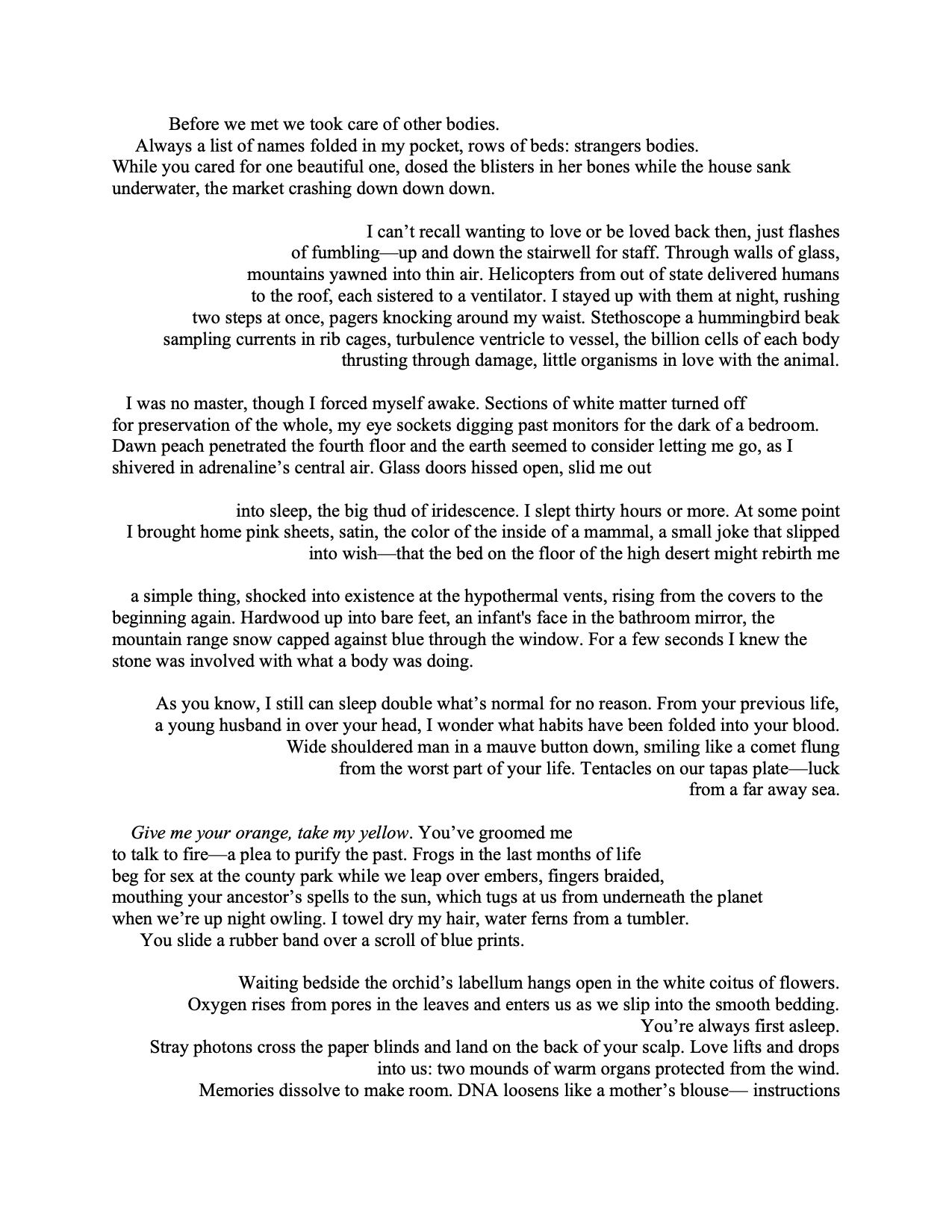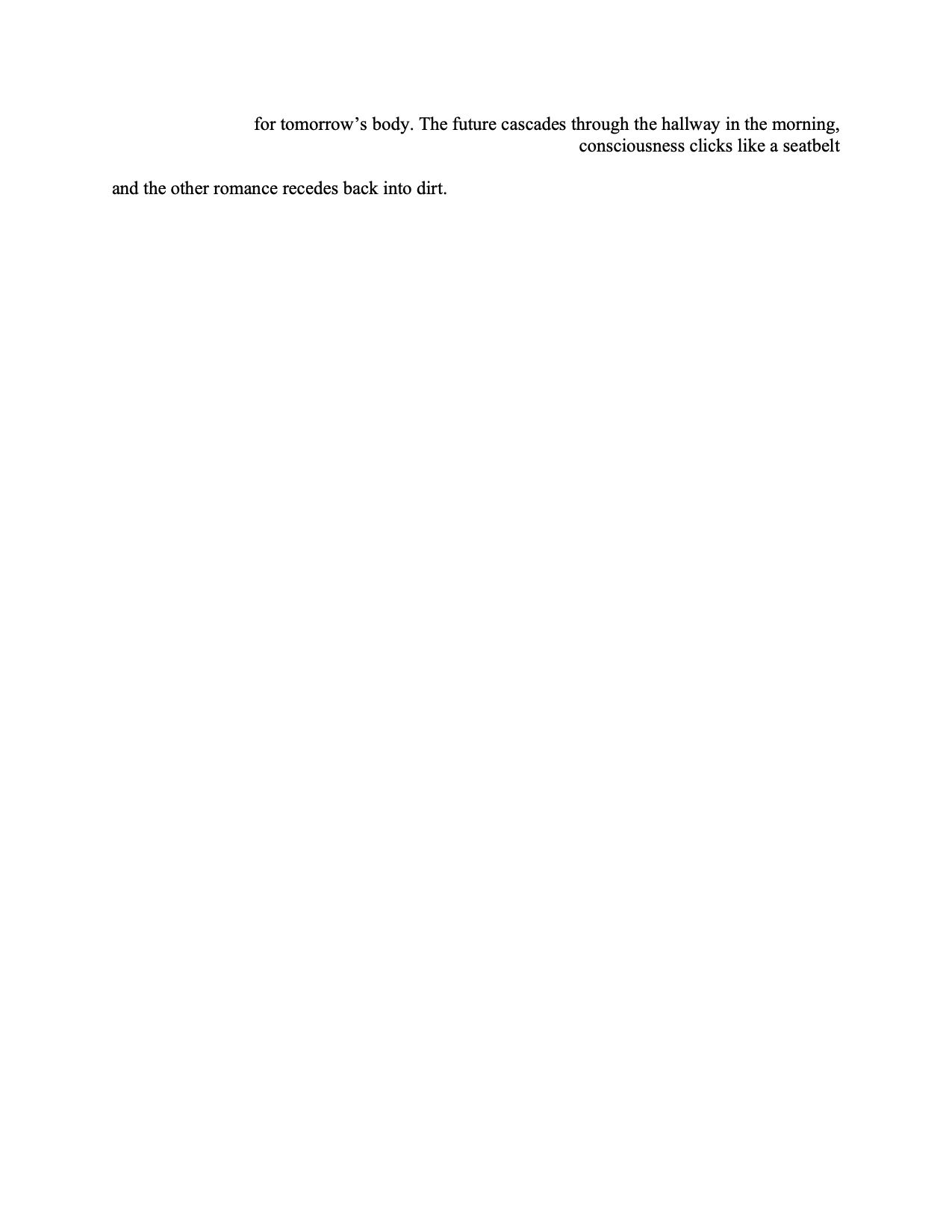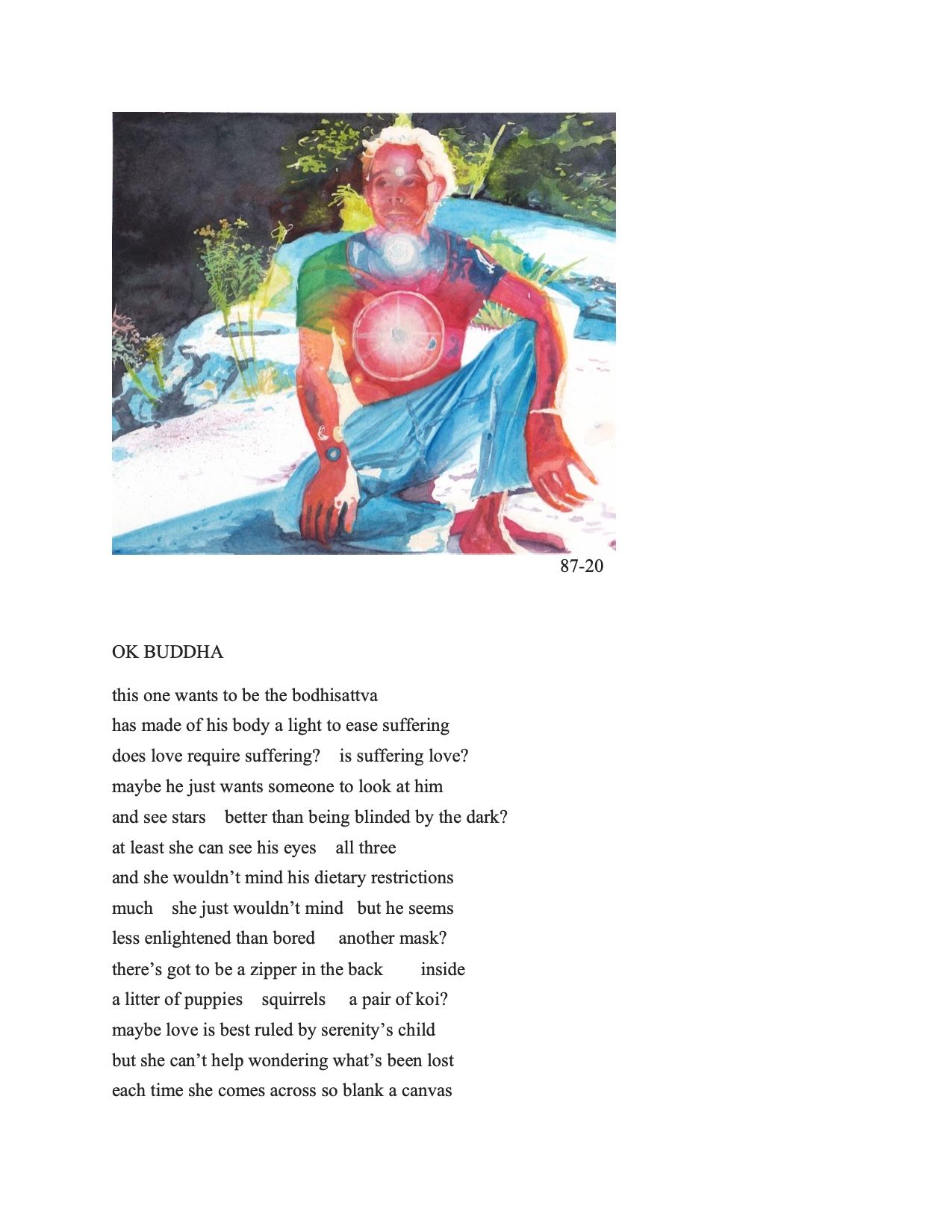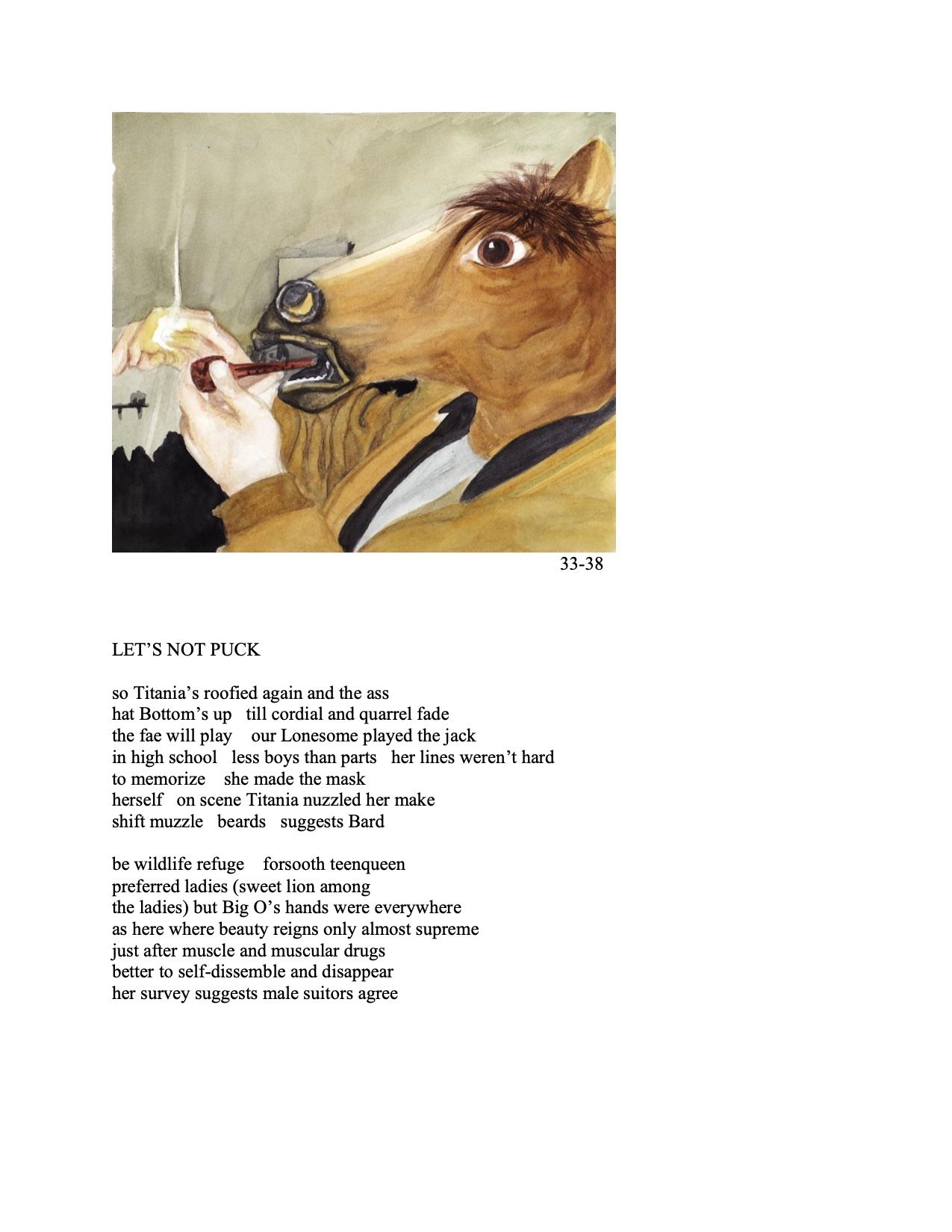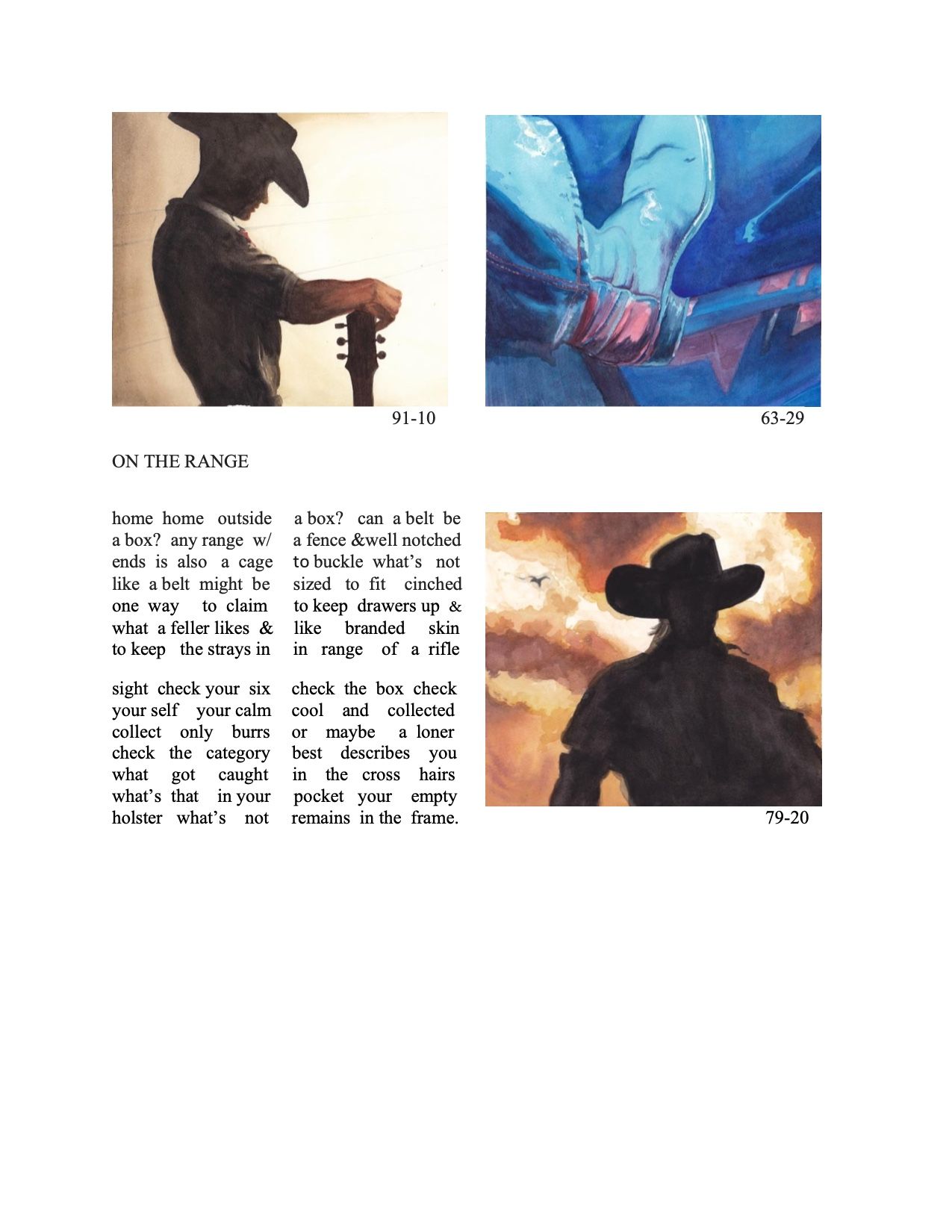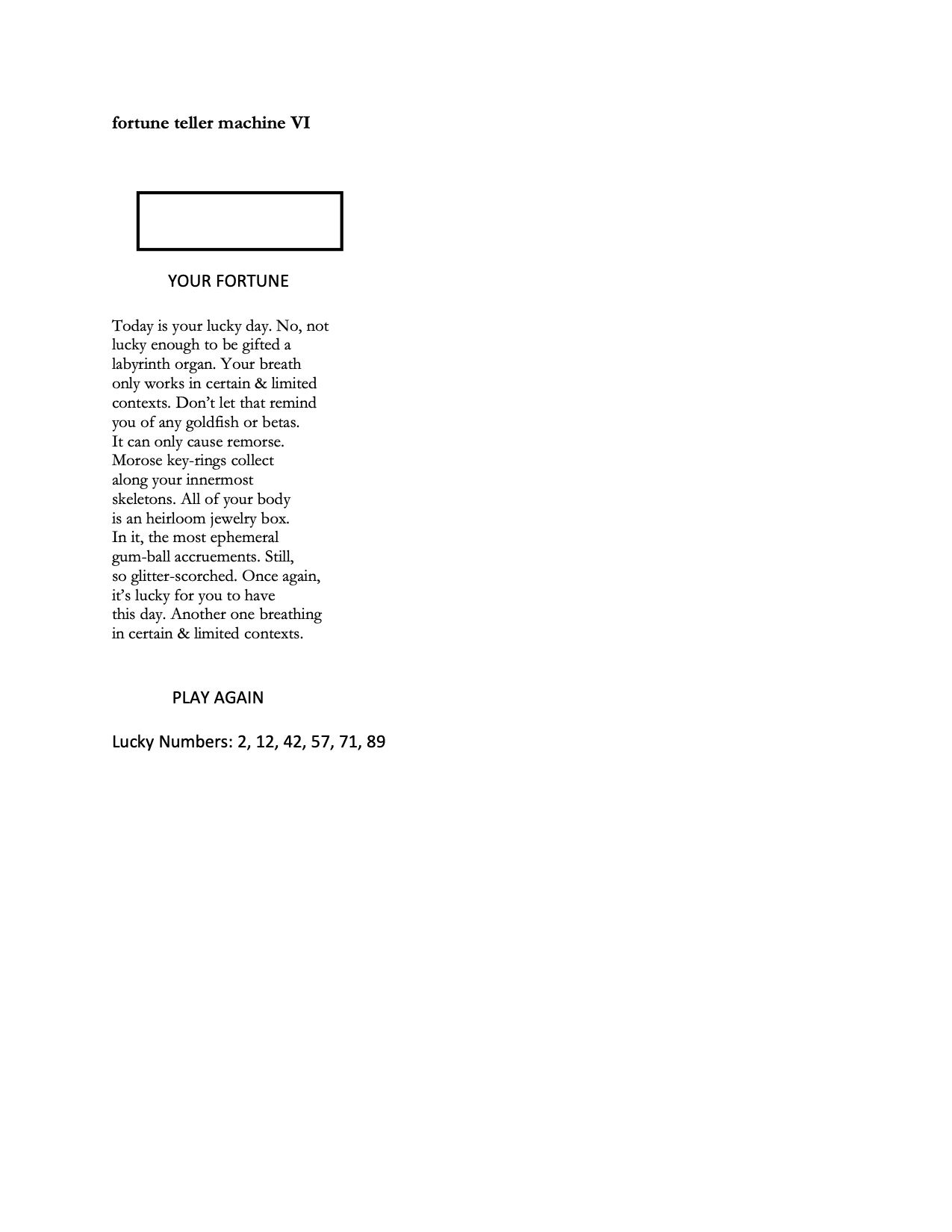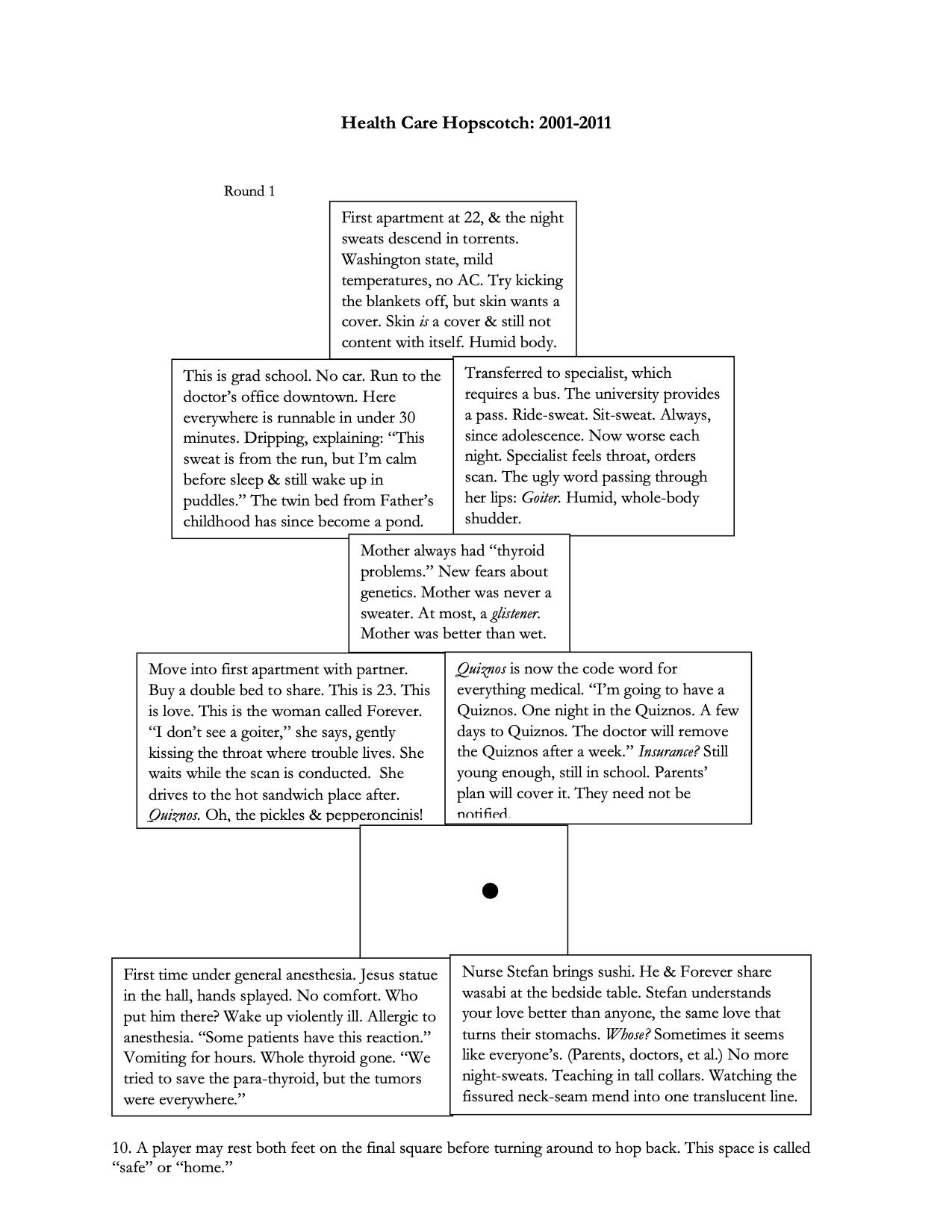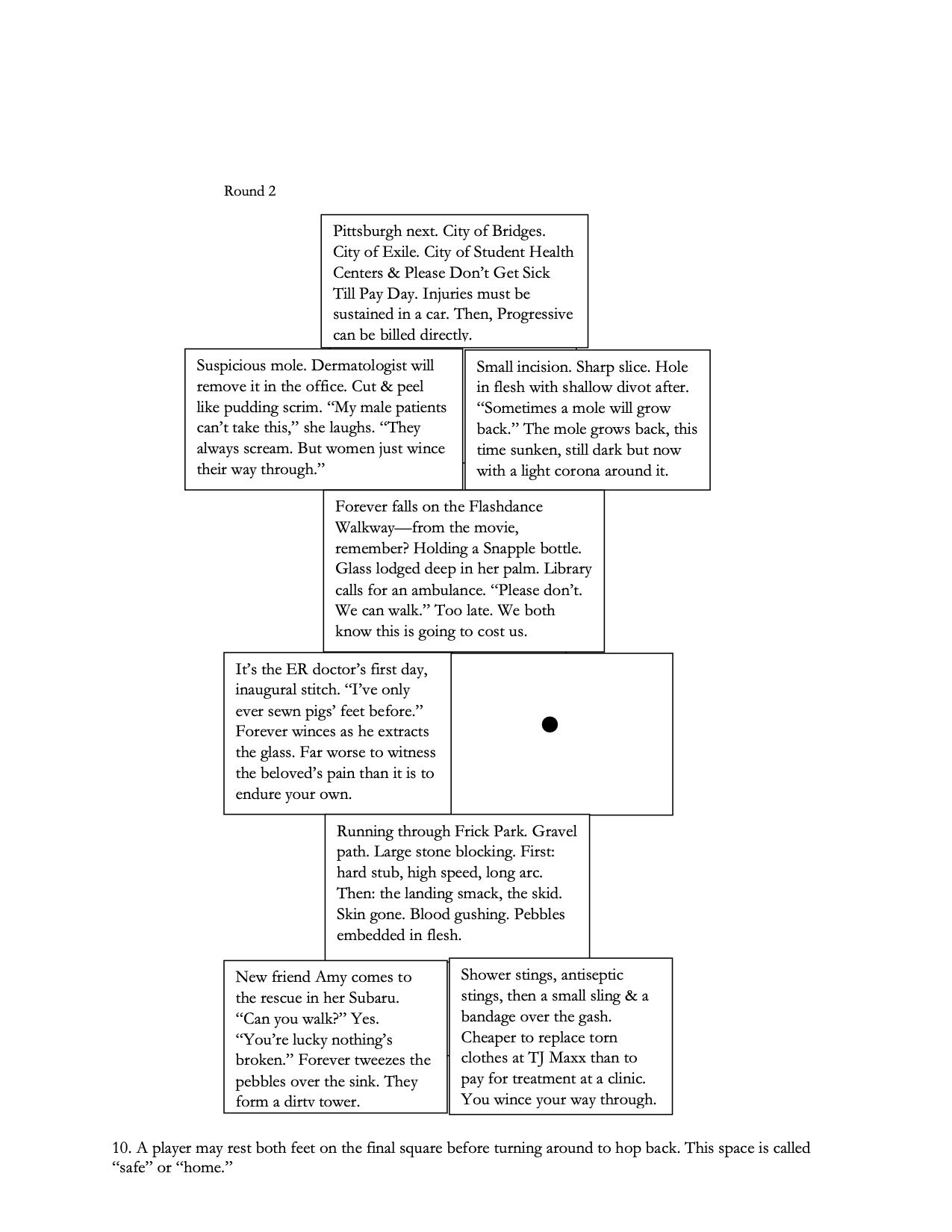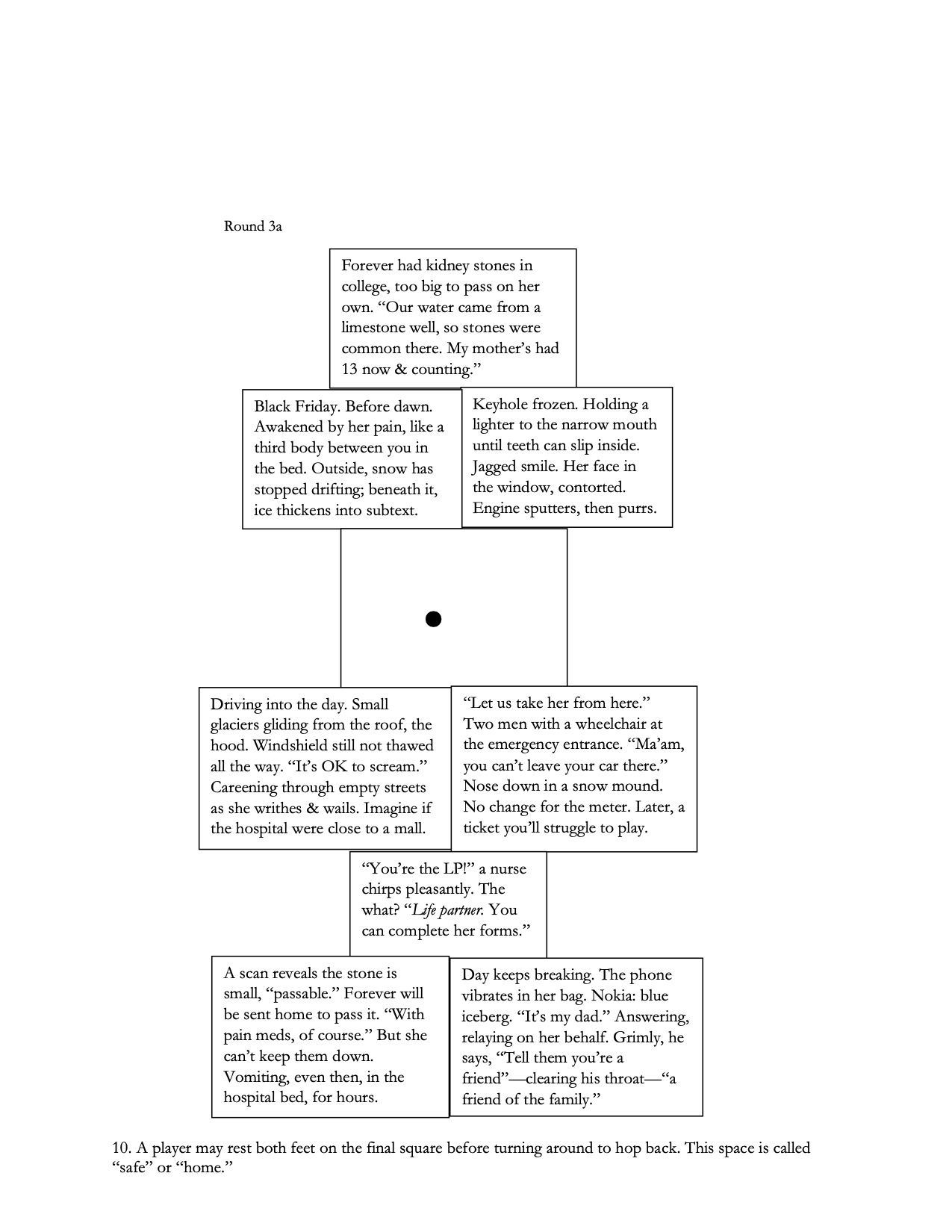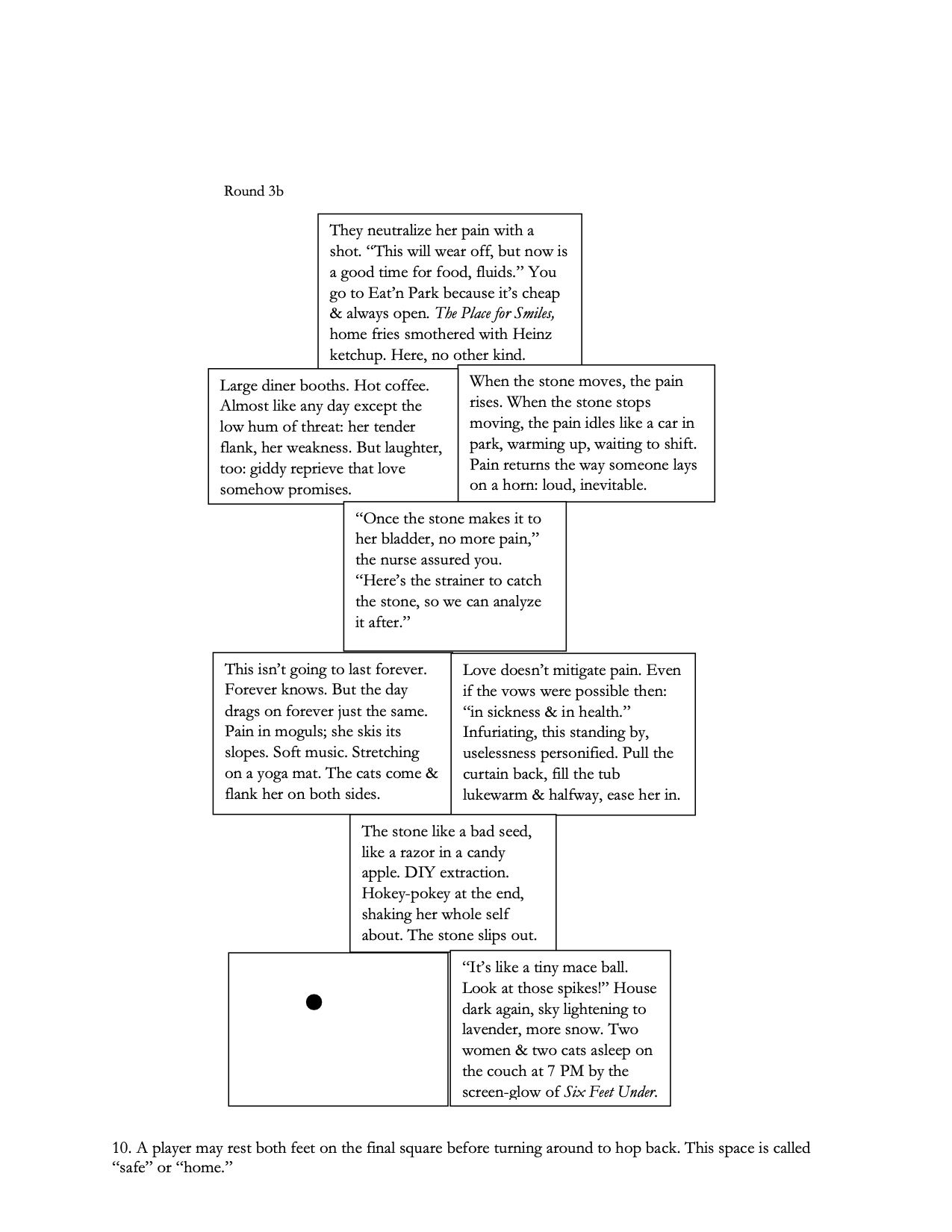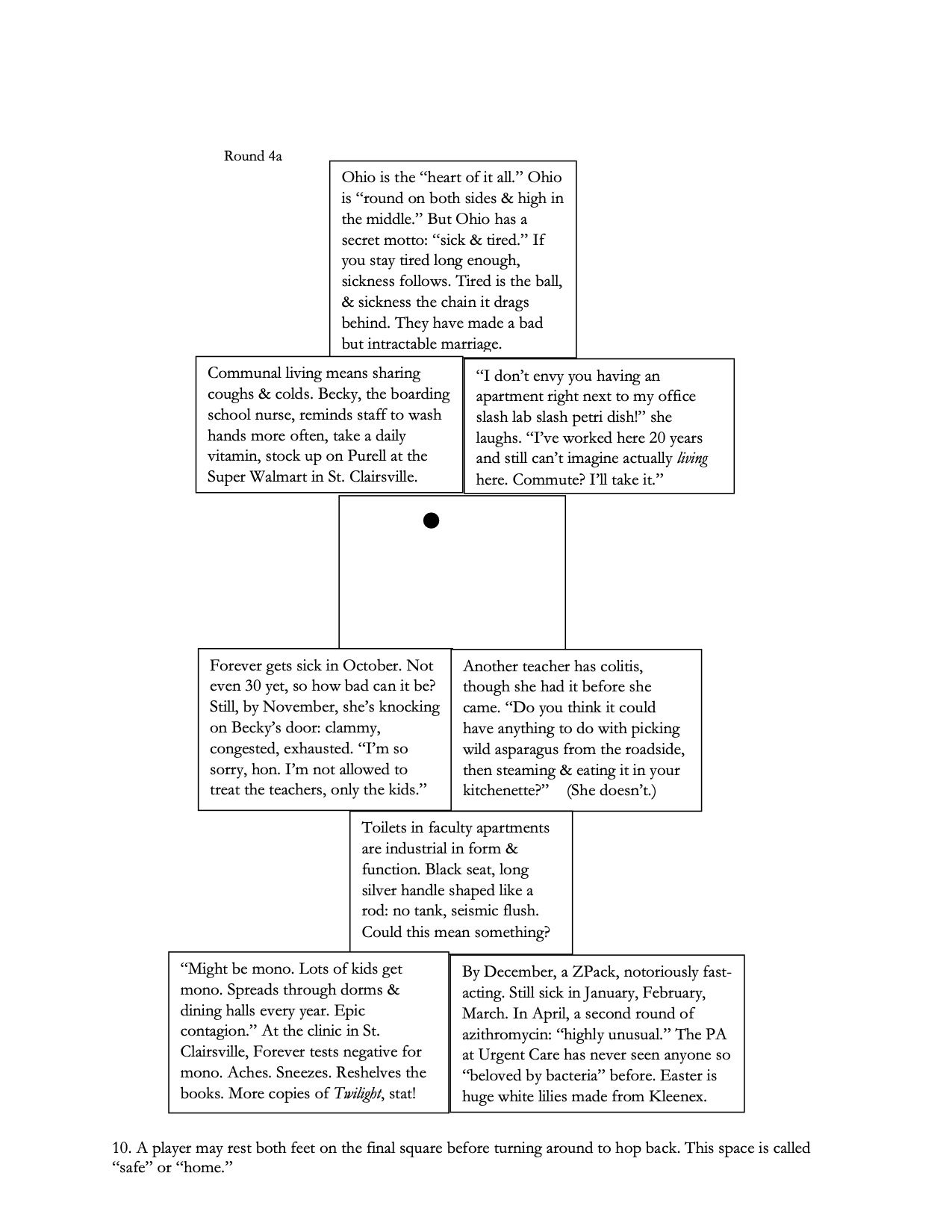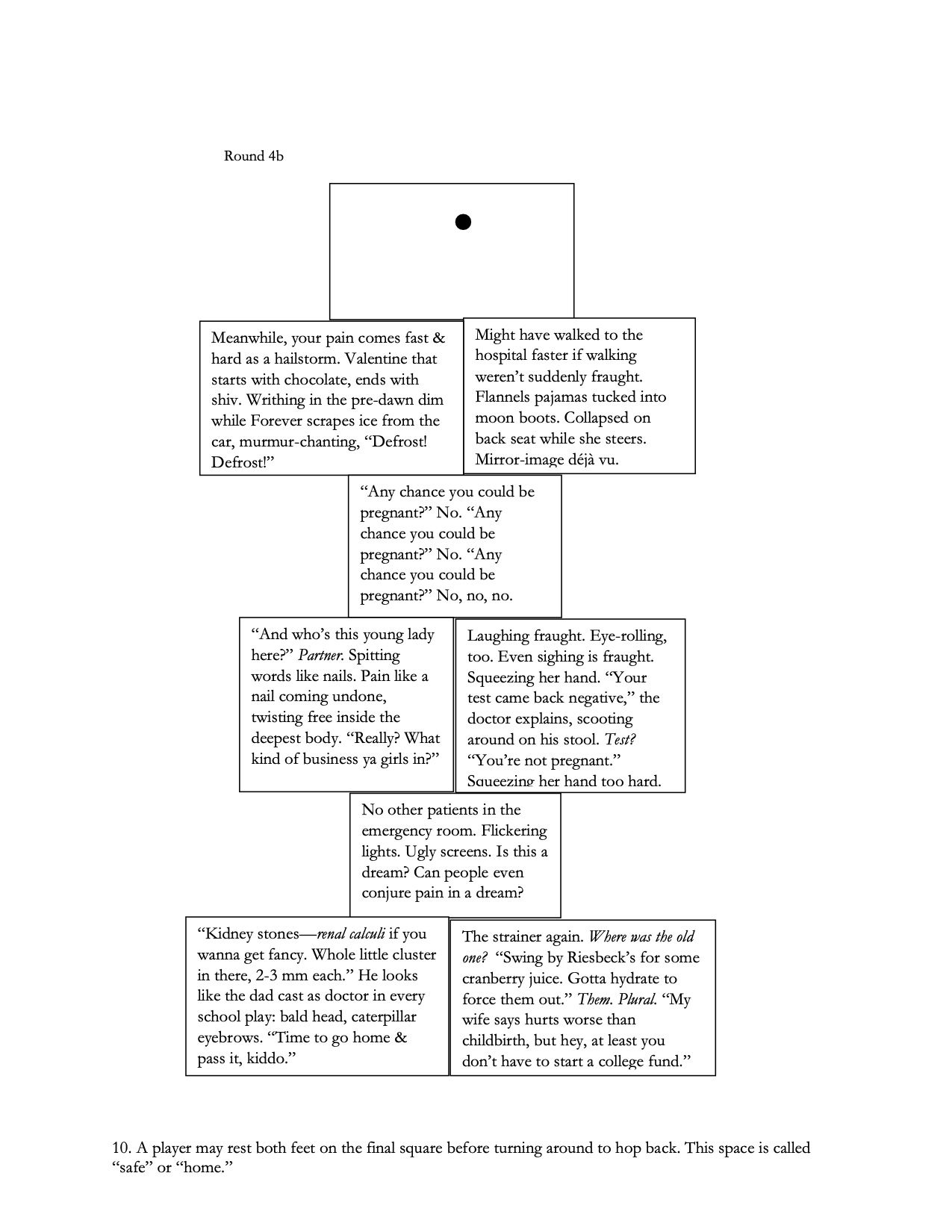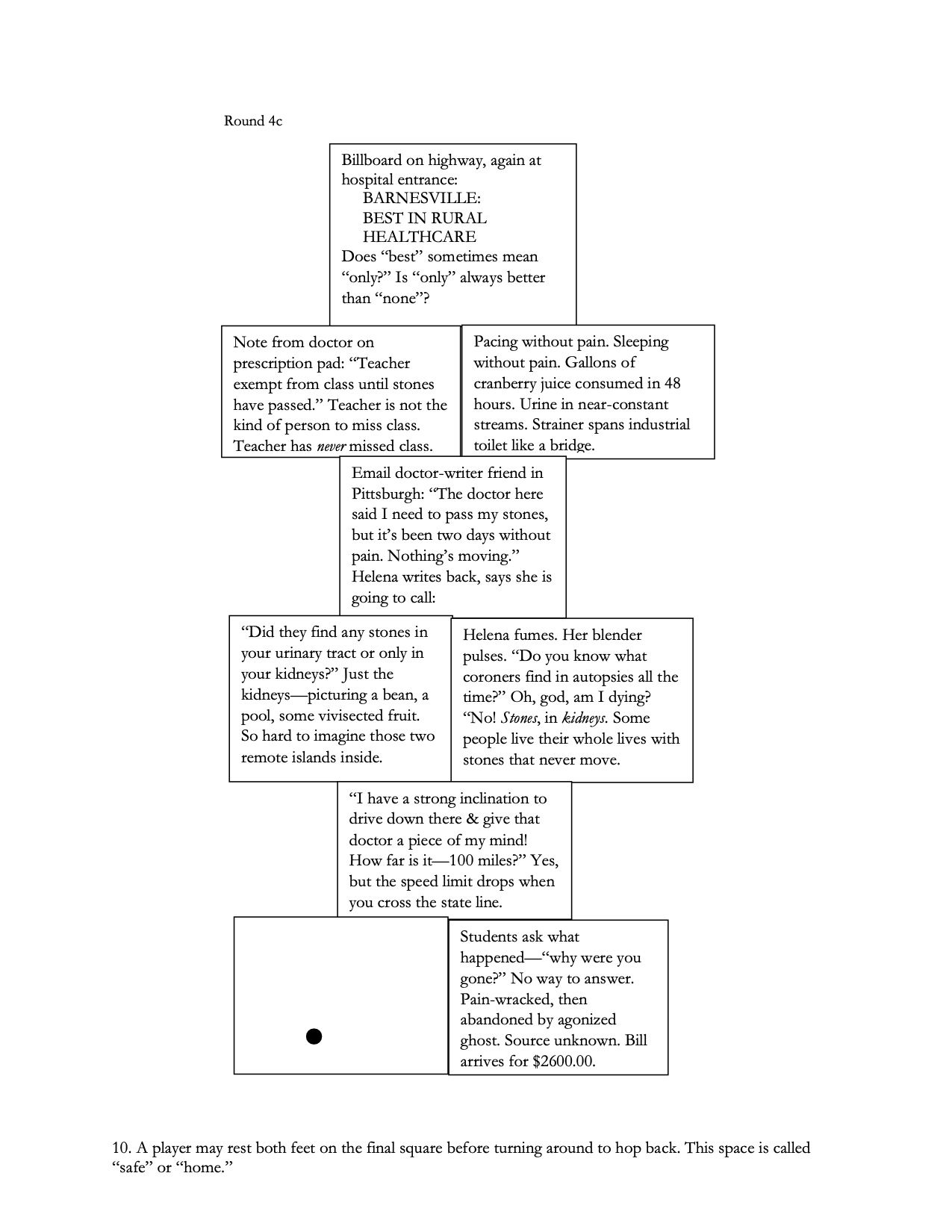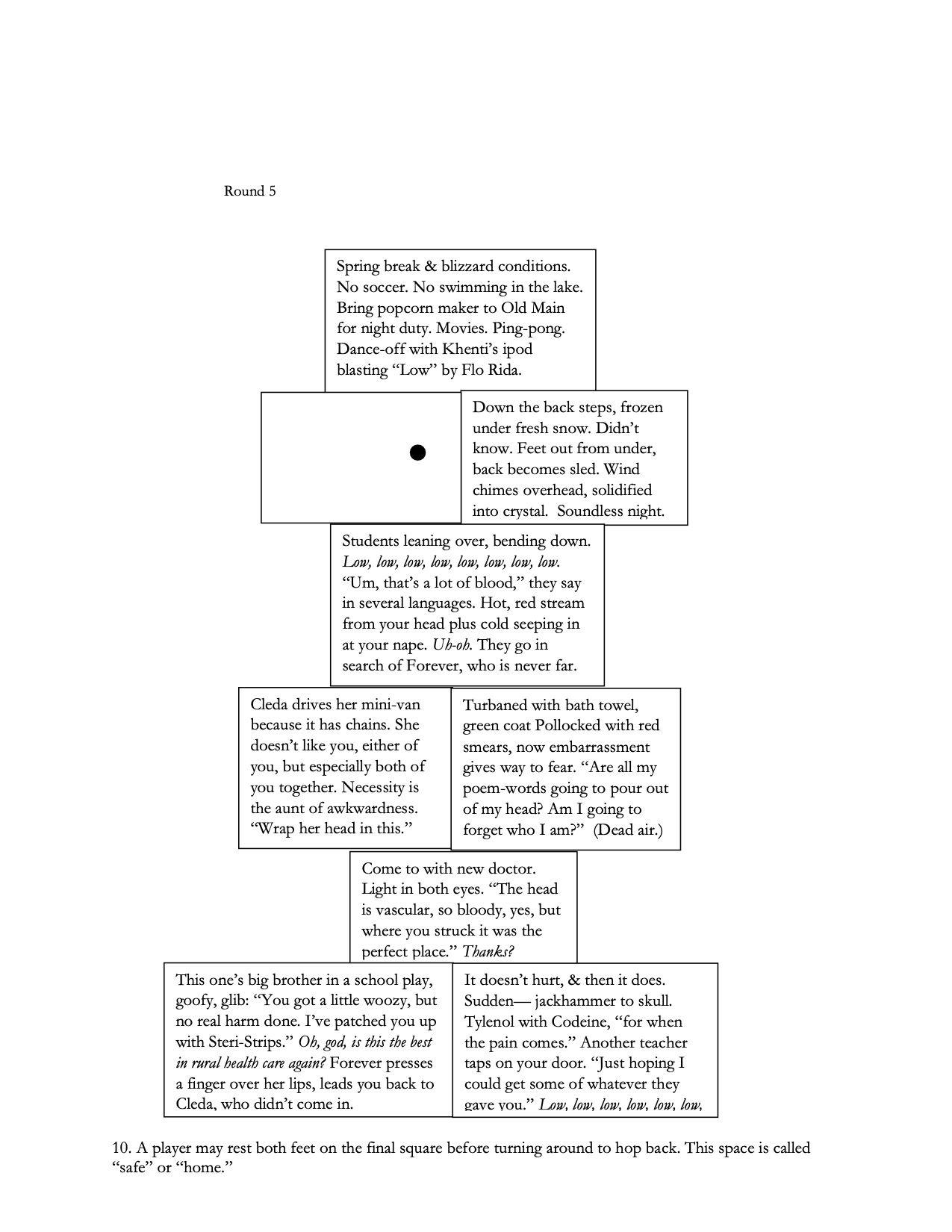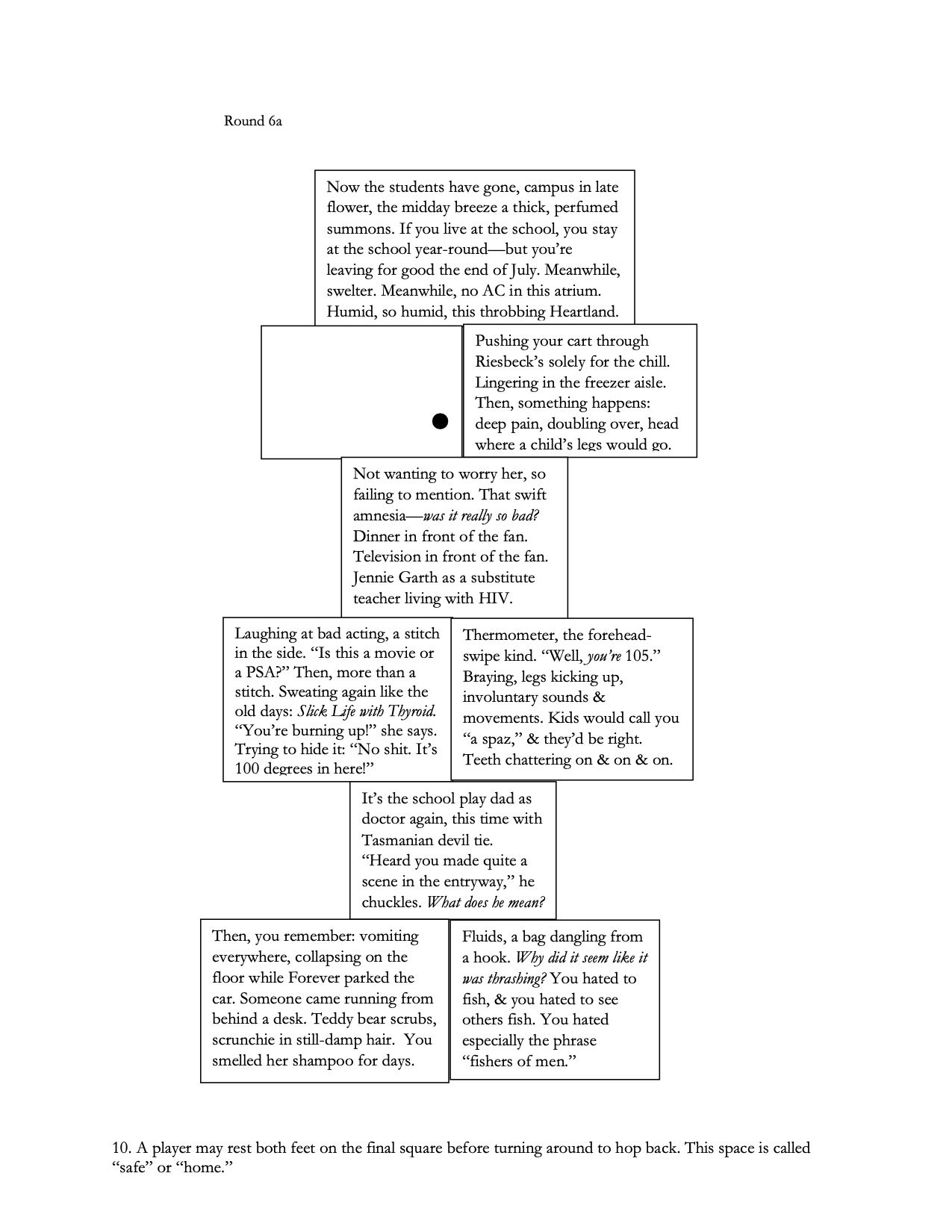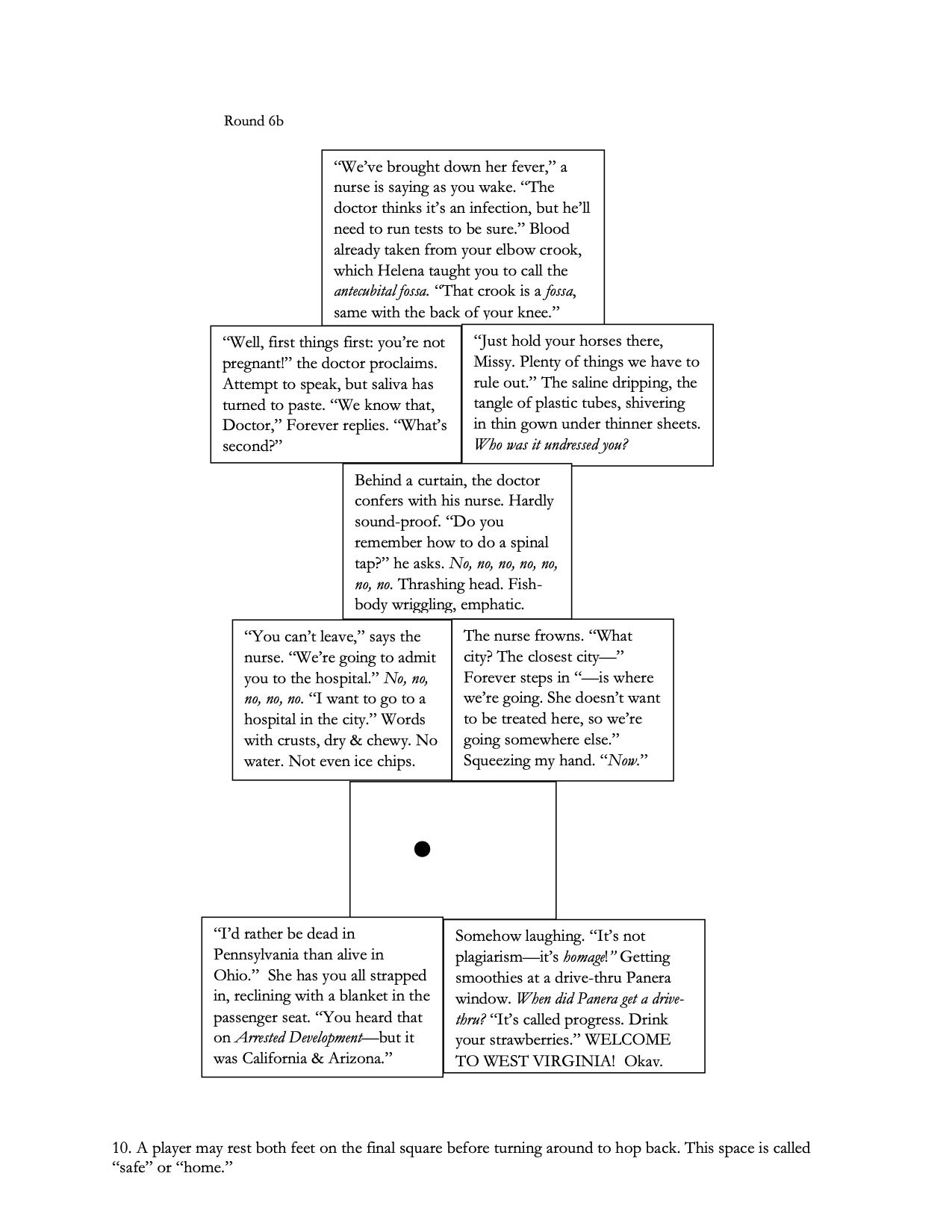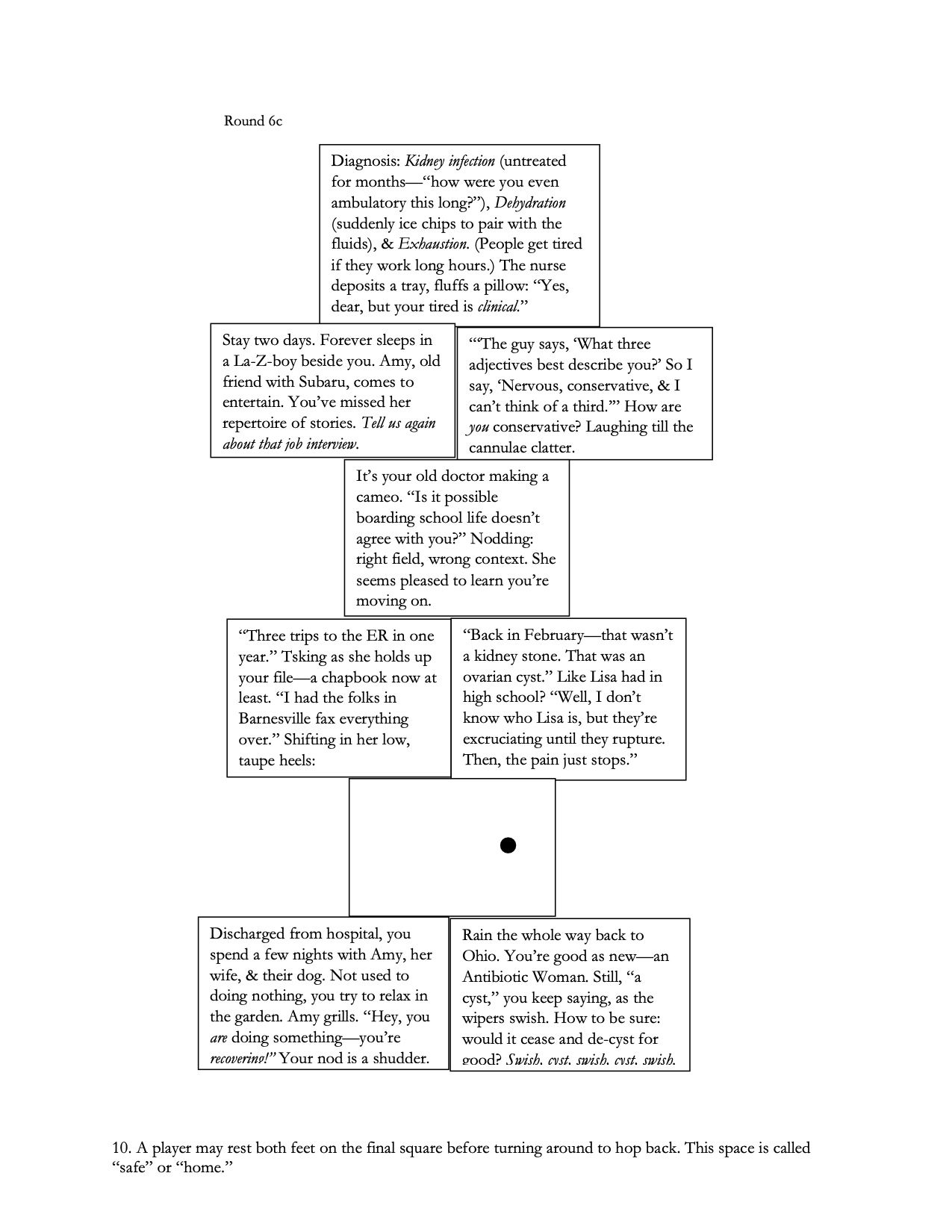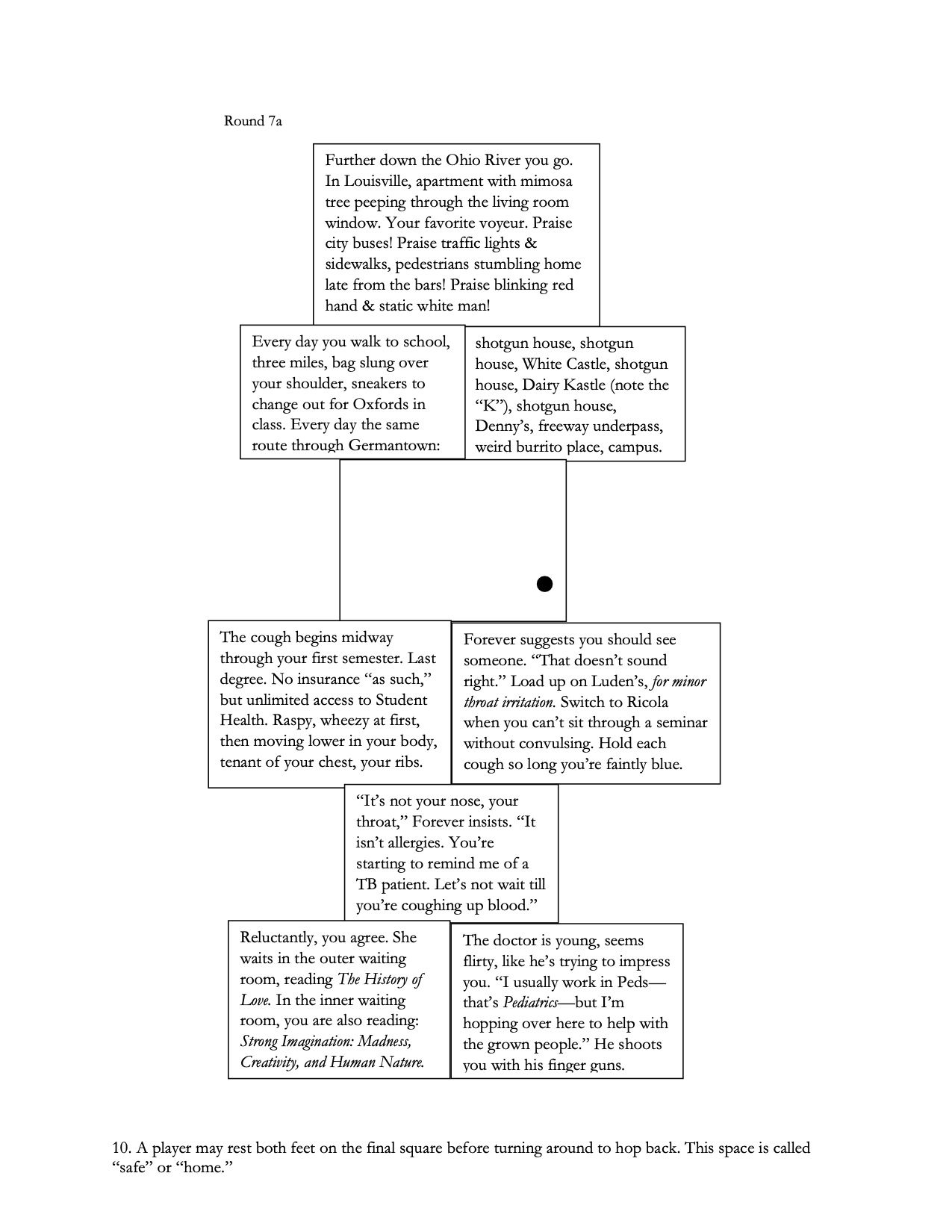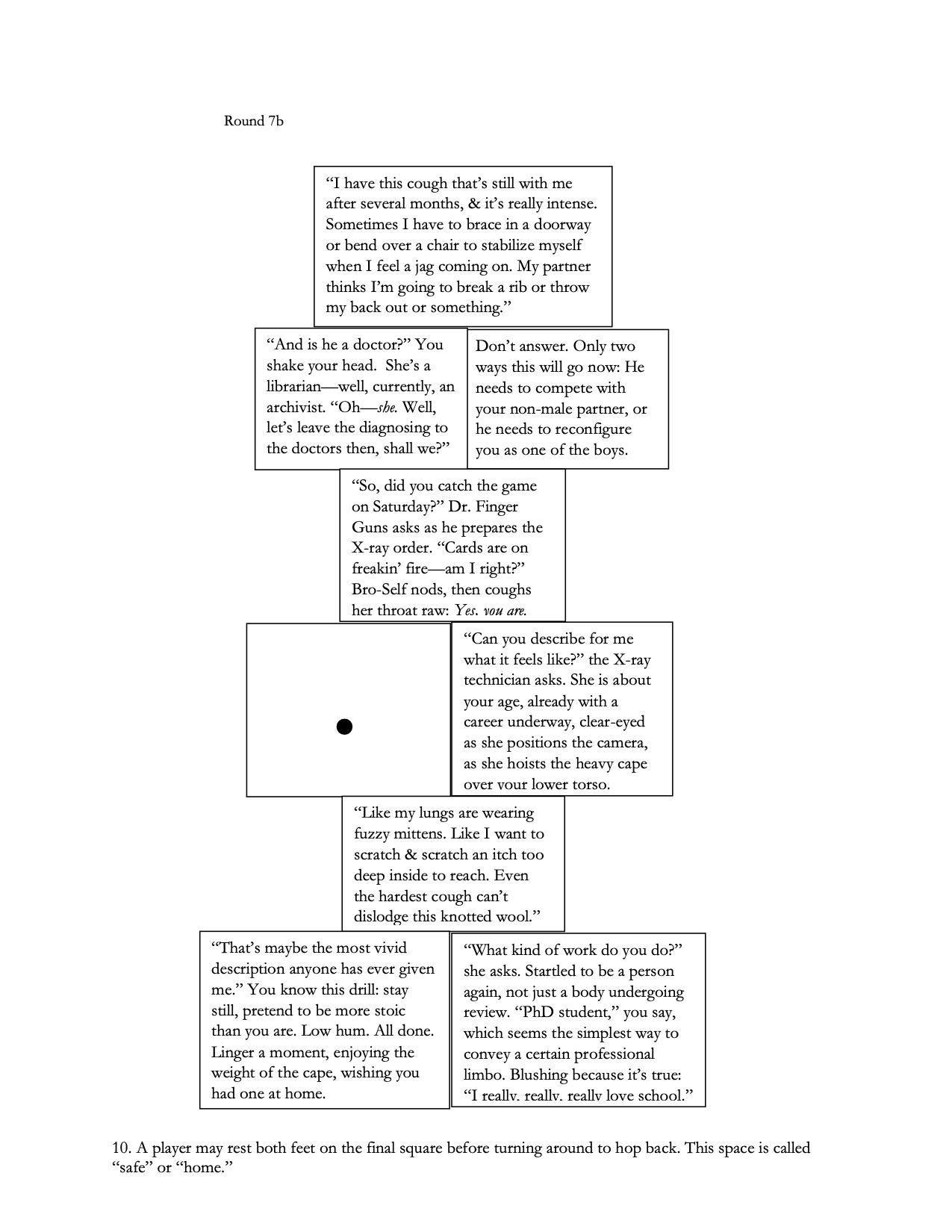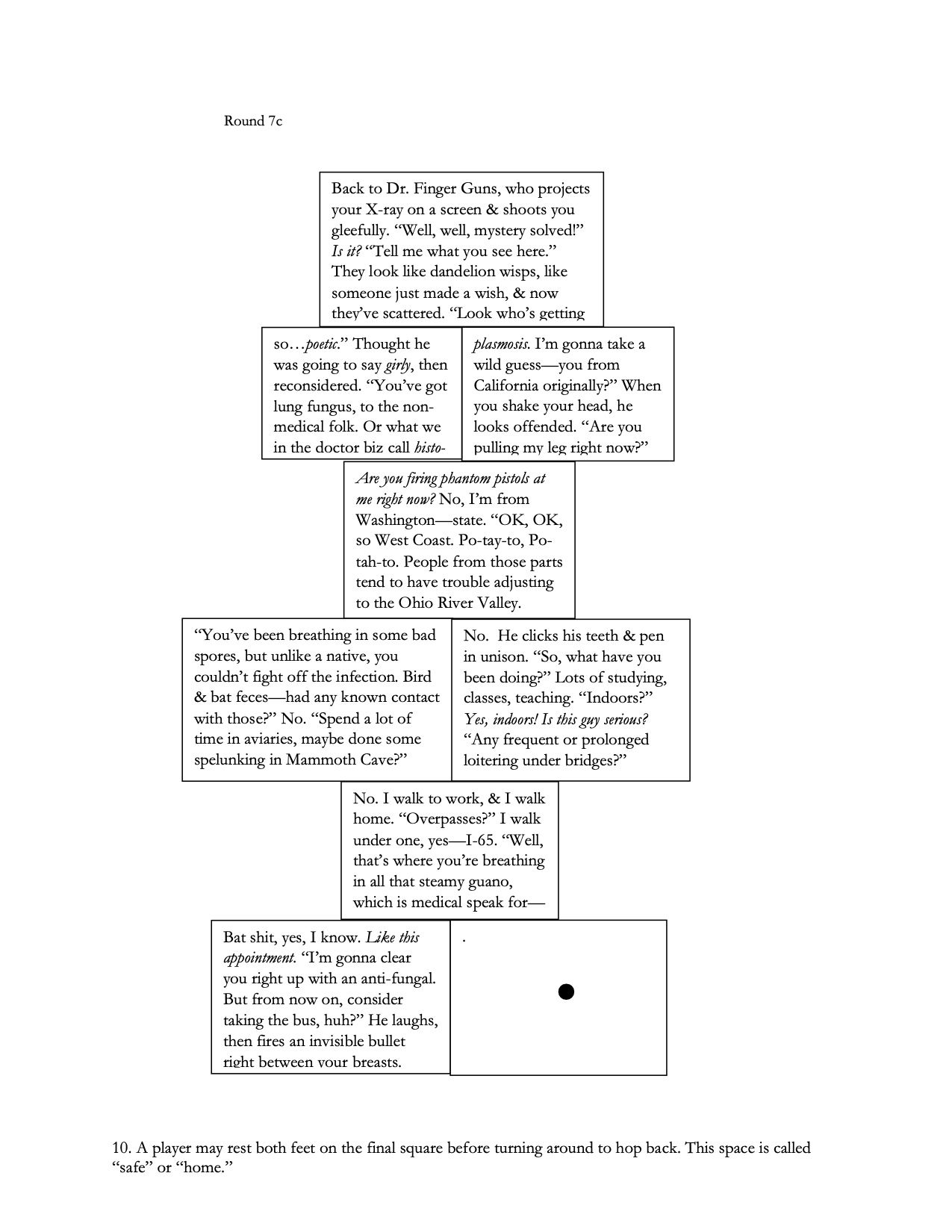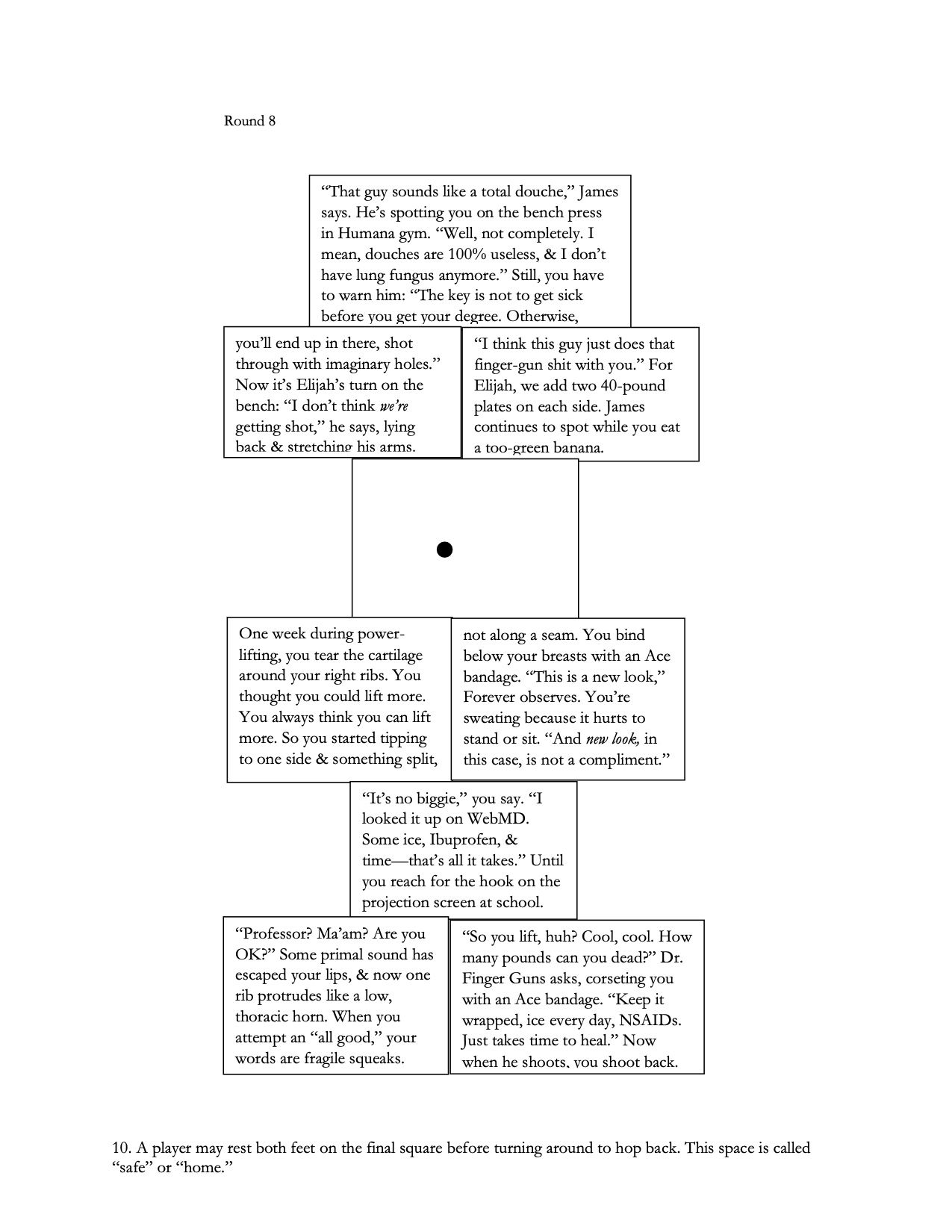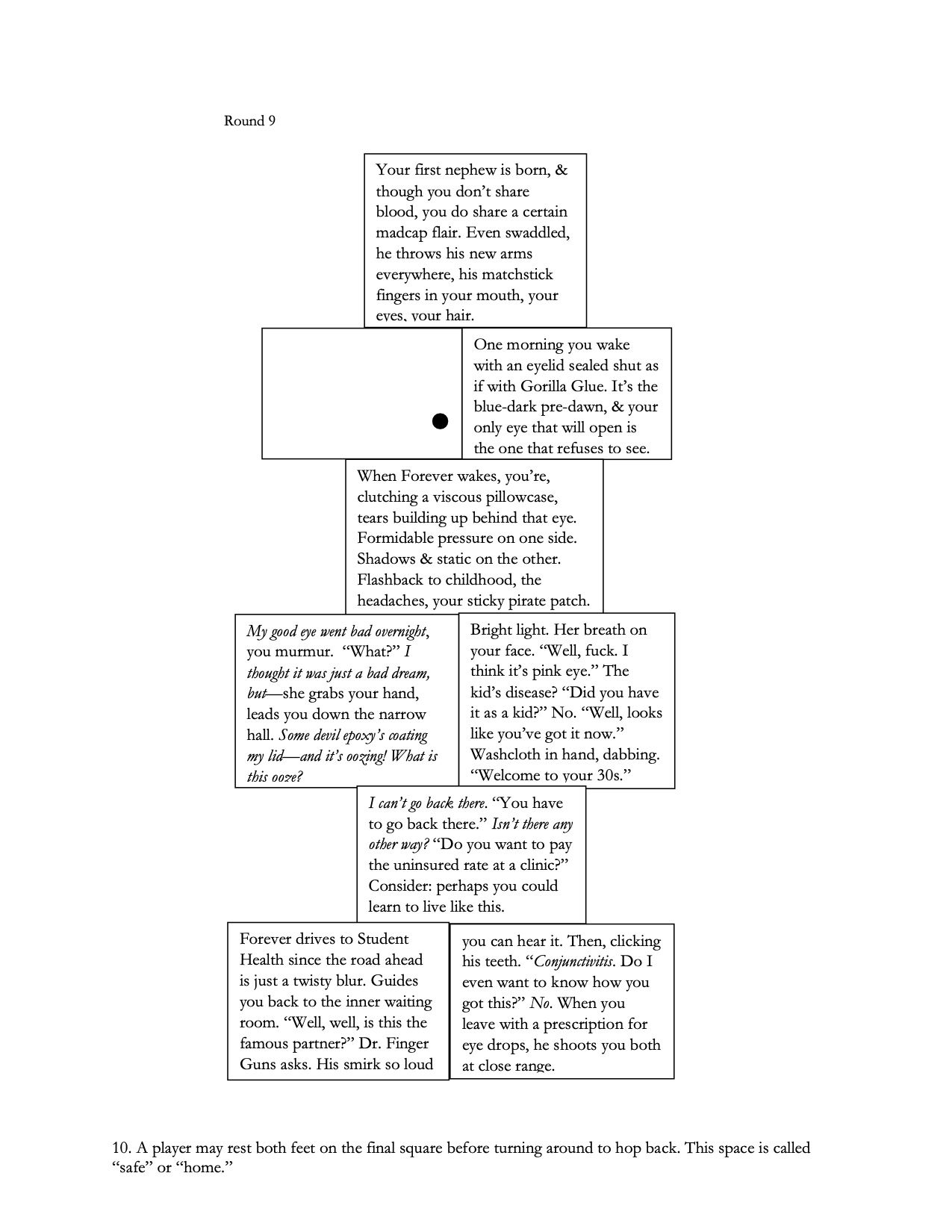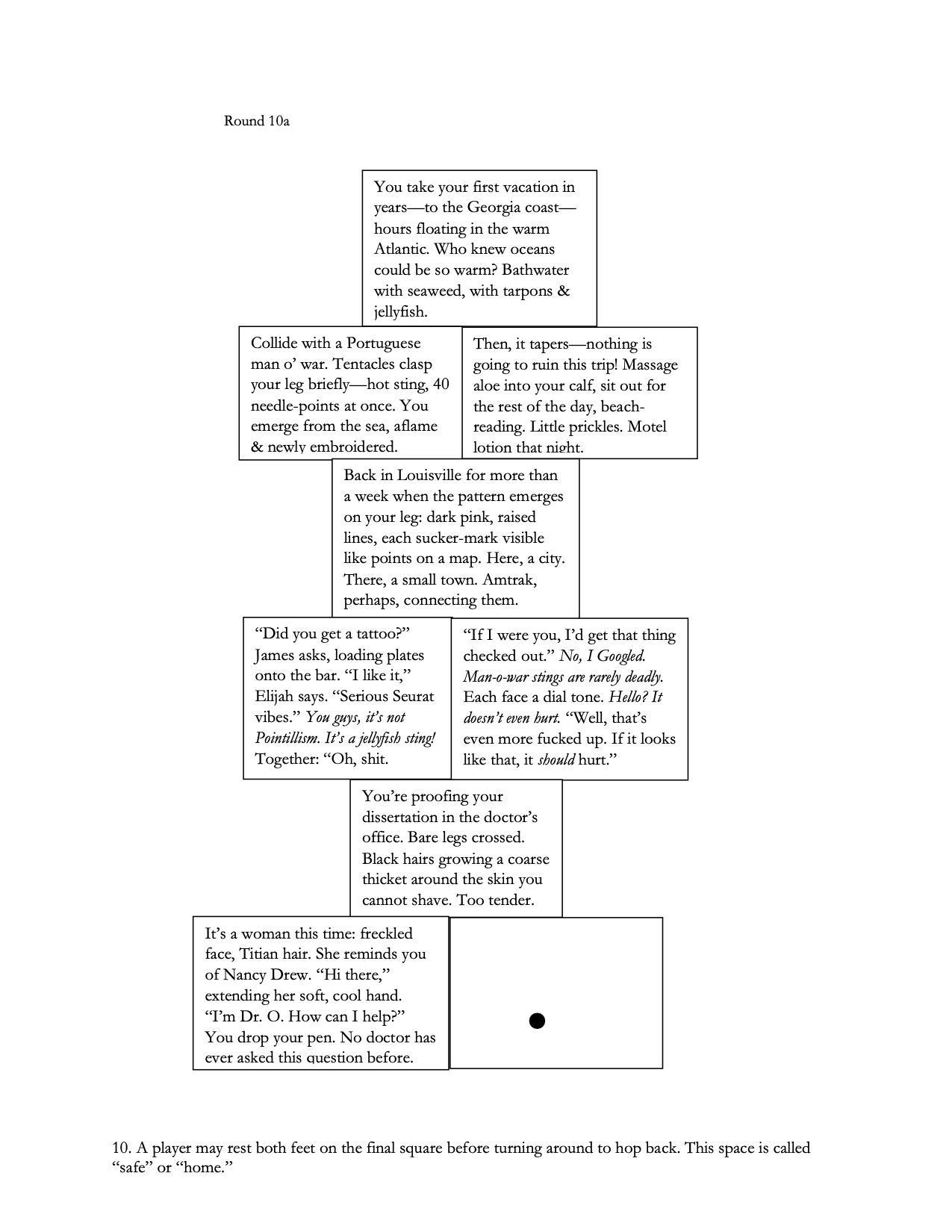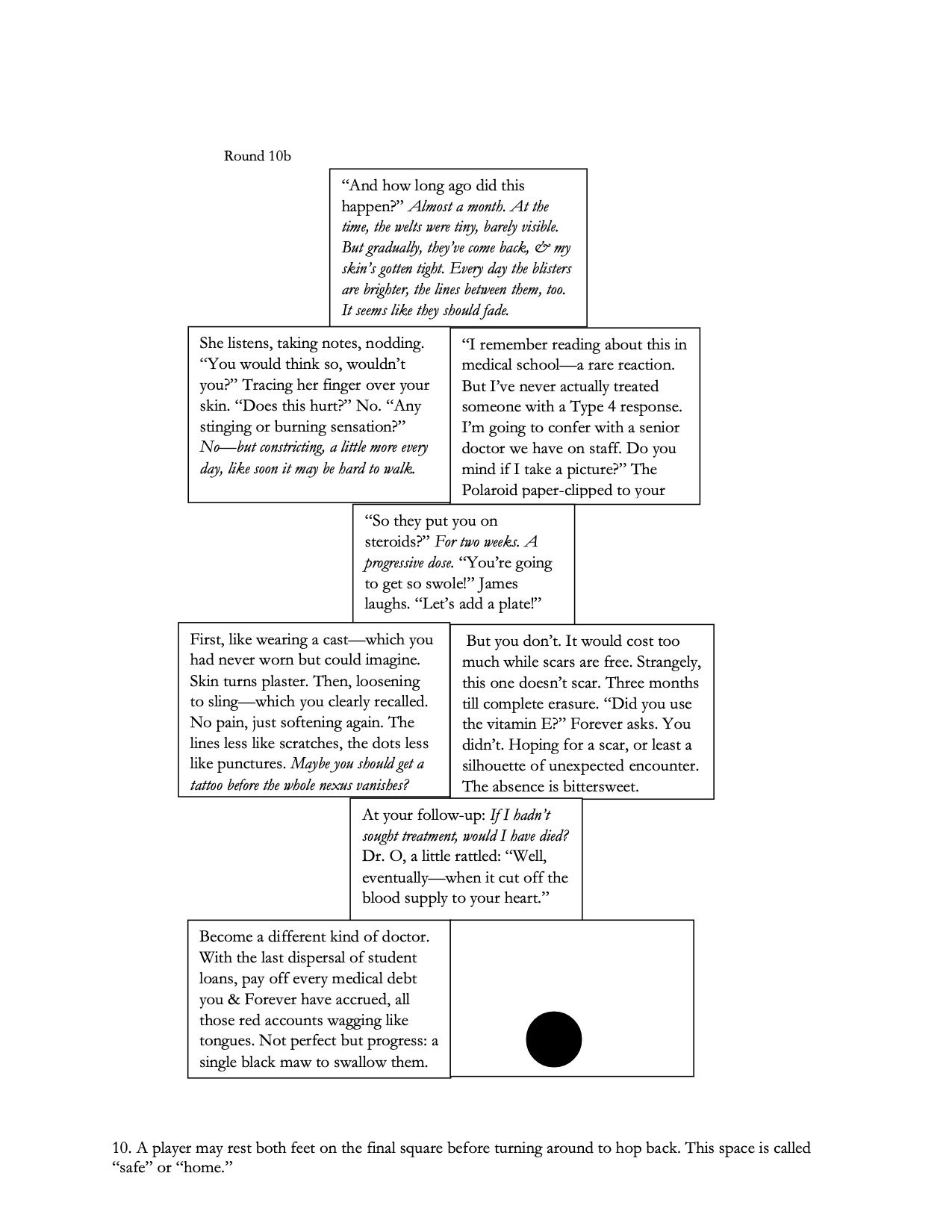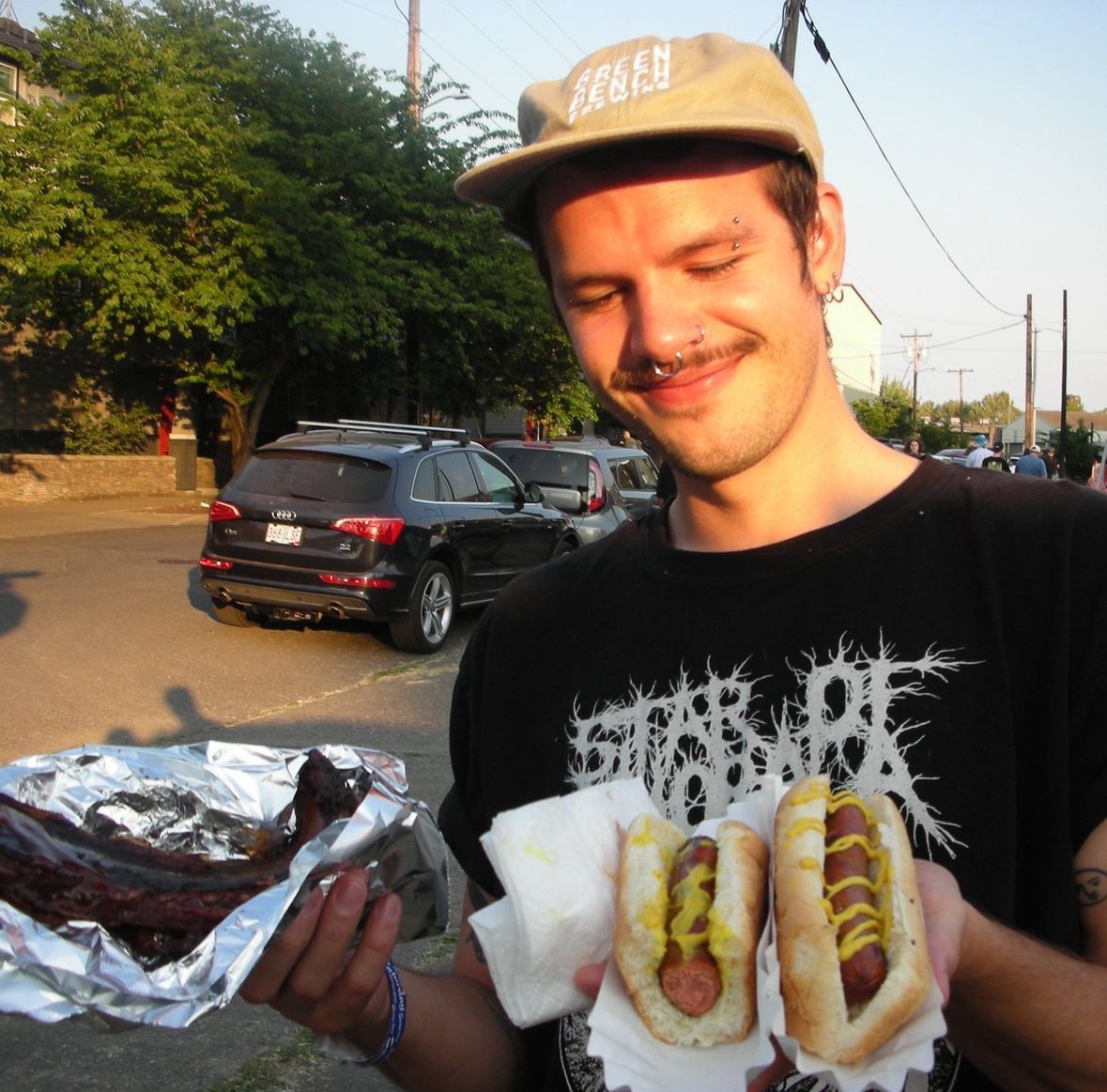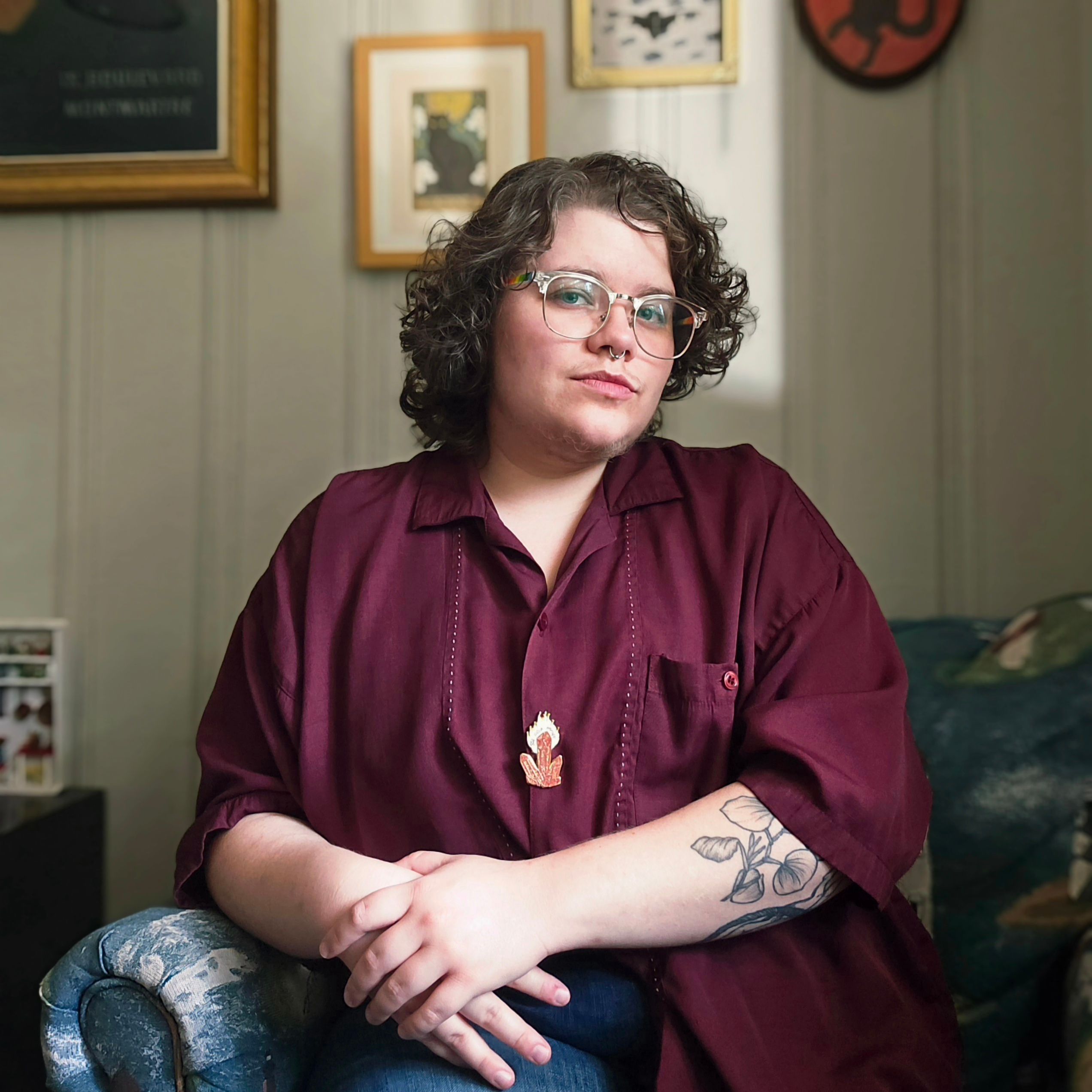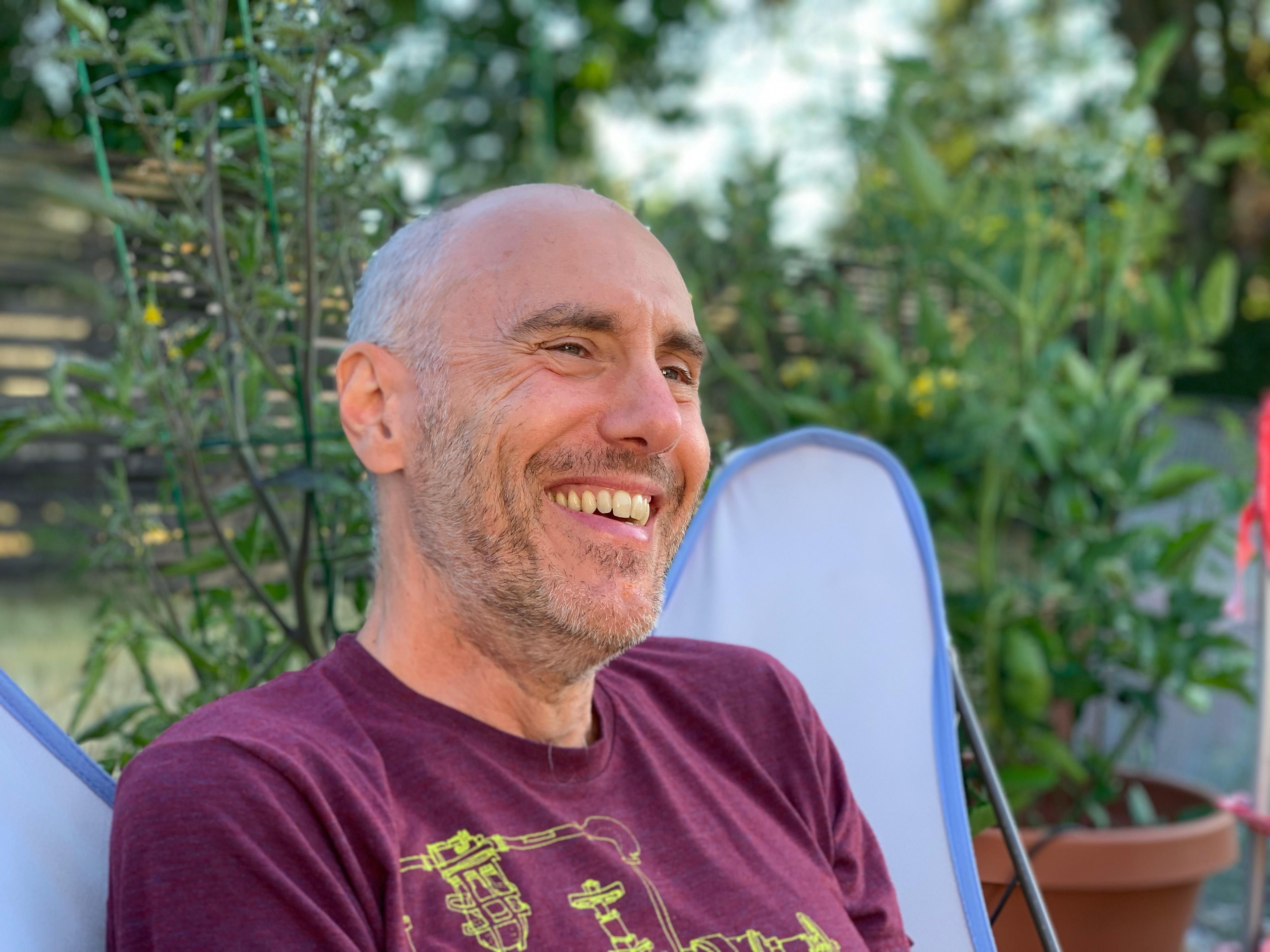When they finally get me to the camp, it is through camouflaged chain-link gates and guards. They hurry me out of the big car and into a canvas army tent that sits nestled at the base of two big redwoods. Behind me they are throwing nets over the car to hide it from above.
Inside the tent I meet Paul and Julia and Roberto and a few others who constitute the leadership of this cell. I don’t trust them, but they have rescued me from the thug’s jail, so.
“We’re so glad you’re here,” Paul says. He has a doughy face with little dark eyes set back into it, and a square jaw with a cleft chin and blue-black stubble that looks like he could sprout a full beard at any second. Someone thinks this man is handsome, I’m sure. Like someone from the twentieth century. Julia is pretty and has long red-brown wavy hair that comes down over her shoulders. Roberto has terrible teeth and hair coming out of his nose and ears. These people seem to be well-to-do. Not kids like I thought. These are older and more established people who are fighting the man because it makes them seem cool to their fucking children.
They are talking at me and telling me that in the short time I’ve been in jail, I’ve become a hero of the uprising, the rebellion, the revolution. They’re not sure yet still what to call it – that’s how fresh it is – but it’s finally happening.
Apparently, the holos of that crazy set with Funkfrolicious and Kirk and those guys from Durt Farmer where I got arrested and pulled offstage were all over the Mind, fan-shot and pro-shot, and some spinner put together a master synth of all of them, hi-res, lo-res, full-color, black-and-white, filtered, and it is super surreal and intense and visceral and millions of avatars have been in there and people are crazy about it.
Apparently, that same day, they broke up all the protest camps with trucks and men with guns and tanks – and the kids dissipated and melted back into the cities and re-formed into cells like this one. They hid themselves away and started arming up and preparing for the next action.
Apparently, the asshole has been vilifying me in his AgitProps as if I am the leader of this Revolución, and he has declared me an Enemy of The People, which of course makes no fucking sense whatsoever.
Oh—and apparently Teen Rabbit is going to tour without me.
They are talking to me like they are in awe of me and my bullshit fame, and also like I am a child who doesn’t know anything about the world. They don’t know who they’re talking to. I just sit and listen and I let them reveal themselves to me. That is useful information that I will have later. They envision me having some kind of leadership role. What that will be, Paul says, they can’t yet say.
They call in someone named Paco – a guard who has been standing outside so you know his place in the hierarchy. So much for socialismo.
Julia says to him: “Paco, please show Ms. Hernandez to her quarters.” I guess everyone already knows what my quarters are. “Make sure she has everything she needs, and stay on watch overnight.”
Julia is doing a show here, making sure I am fully aware that she is taking care of me. That she is giving orders. She is the kind of woman who would put on a strap-on dick and fuck you from behind.
Paco nods.
He is handsome and Mexican. I can see immediately that he’s a poet. He’s got a poet’s soul. He has big, rich, brown eyes and a gentle manner.
He points out the tent they’ve set up for me, just a regular nylon camping tent, red-brown like the rest to match the forest floor. Inside are some clothes, clean and folded. Fatigue pants in digital forest camouflage. A brown t-shirt. A thin wool pullover. I take the clothes and tell him to take me to the shower.
I swear I see him blush. He’s already thinking about fucking me.
It’s not exactly a shower, he says.
The “wash tent” is an old-fashioned army tent pitched over a bunch of wooden pallets, and some sort of drainage ditches that lead out and down toward the creek. Inside it smells of bay laurel and eucalyptus and decaying redwood needles and mildew and ammonia. The vague cat piss scent of the redwood forest.
I sit on a wooden stool and clean my body with a washcloth and camping soap in a bucket of hot water that a girl brings in to me and that smells of eucalyptus. I would prefer a real hot shower, and though I scrub and scrub I can not get the stink of the jail out of my skin and my hair and my nose and my mouth. But this is the cleanest I have felt in weeks. It will do. I can hear a crow and a Steller’s jay arguing outside. I am desperate to shave. Maybe tomorrow after I tell Julia how impressed I will be with her fucking power if she can get me a fresh razor. Or maybe I will go natural, get furry. Become a real fucking wild girl of the forest rebellion.
When I am freshly washed or at least sponged, and feeling clean and almost like a fucking human being, Paco shows me where the basic things of camp are. The mess tent, the latrines, the supply tent. A few people stop me or at least come up to meet me, blah blah blah. They don’t always introduce themselves. They just Ms. Hernandez like I am a senator or a bank customer or something, or if they are fans they call me Alejandra or even Alex, like we’re old friends. You get the feeling they would bow down and kiss your toes, and you almost want them to.
Hi Alex, this one young girl says. She’s darker brown than me, and her hair is blacker and her skin is silkier and quietly I already hate her for this, and I understand vampires all of a sudden, how they stay alive forever by drinking the blood of the young. She says can I hug you the way the kids of this younger generation do, like they need permission to love, to be human. Like to hug someone without first asking permission is like a rape.
It’s not like a rape.
But these kids, so. I say yes it’s OK.
She hugs me and she tells me about a Teen Rabbit show she’d been to, her first one, at the old Cal Expo in Sacramento. That it changed her life. Etcetera.
I am not comfortable about getting these compliments, but I drink them in. Keep going, I want to say. Tell me more about how beautiful I am, how amazing my voice is, how you have all my records, how my songs saved your life. I need this. I need anything but this. I don’t know what to say. I never do. How to do this without diminishing myself in their eyes like it’s their fucking admiration that makes me real. So I nod and smile and say thank you, honey, you’re so sweet, and you’re so beautiful, and I hear myself laughing from outside myself, and I feel like a deer pinned against a guardrail.
“I’m definitely Team Alex,” she says, and she laughs knowingly and I laugh with her, but the bottom has dropped out below me because this stranger is inserting herself into my war with my fucking sister and she doesn’t know me, this child, and she doesn’t know my asshole sister and she has no fucking business.
By the way: where the fuck is my fucking sister? Where the fuck was she when I was in jail? She never came to see me, never tried to get me out. Didn’t do shit. I vaguely remember I am trying not to remember the last time at rehearsal screaming at her for trying to control me and calling her a fucking cunt I am trying to remember can’t remember to retrace what happened step by step how we got there I don’t want to and I make a noise out loud to squeeze it into a tiny black sphere so i don’t have to look at myself. i can see her sitting behind her white fucking grand piano in Mill Valley chuckling that finally i will learn my lesson and making plans, making plans to replace me, the same way she was there and Papá was gone and the way she looks just like him, the way our mother always says that she is just like him, she has his face, his eyes, his coloring. She is like a shadow of him standing in front of him so that i can never see him, i only see Angél and i feel the sirens start to go off in me and i try to quiet them and come back to the moment i am in.
The girl is waiting for me to acknowledge her loyalty to me or something.
I bite my tongue and I smile, and I ask Paco to take me to my tent.
He is going to stand guard, he promises me, and that is good. I trust him implicitly. We have some kind of connection already. Already, he would do anything for me including die for me, right here in the forest. He has a pistol on his hip. I fucking like it. He’s not some racist shit white fucker with a gun. He’s something much more interesting than that.
I climb in and I zip up the zippers behind me. It’s just a regular camping tent but inside it feels plush and dry and clean. The floor is covered with thin air mattresses, and those are covered with unfurled sleeping bags zipped together to make a luxurious camp bed. They must have read an article here that I am a fucking primadonna or some bullshit and I am glad for it because really? I’ve been in jail. I don’t need to sleep in the fucking dirt with the bugs.
So I lay on my back and I look up into the ceiling of the tent, and I can hear Paco sighing and turning the pages of a book. It sounds like he’s writing.
I stare up into the ceiling of the tent, through the mesh and into the rainfly. It’s like a cathedral or a concert hall or an arena, the way the fabric stretches to crest above me. The Teen Rabbit tour is about to begin or has begun. My fucking sister is going on tour without me like that is a real thing, that there is a Teen Rabbit without me, and she is still calling it Teen Rabbit. And who is going to sing? Fucking Sami Reyes. A fucking joke. That little fucking teenybopper is going to sing my shit. Fuck you, Angélica, fuck you. Like she is mocking me. You know? When you lose a band member, like when Meliza quit or when I fired Gabriela, you replace her. But not the lead singer, the front woman, the face and soul of the fucking band, without which there is no fucking band because the band is me.
Especially not when I am in exile because I was arrested by a fucking dictator for trying to save people’s lives. Fuck.
I look up into the nylon ceiling of the arena and I imagine that I am a giant, laid out on the floor like a mountain and the 25,000 little people are standing all around me and crawling on top of me and at my feet is the stage and Teen Rabbit is on it and Sami Reyes is singing and everybody is dancing and I am trying to scream I AM HERE but no one can hear me. No one can hear me.
* * *
I am relieved when the forest lightens into deep blue and I hear the gas jets of camp stoves. When I smell coffee I get dressed and come out of the tent. Paco is still there. I make him give me some of his coffee. It’s strong and rich. He brings me to the mess tent – a camouflaged sun shade like you would have in a parking lot, with food set out and coffee urns. I take a mug of coffee, thank god, and we go and sit on a fallen chunk of redwood and look over the creek. There’s still a morning fog – it’s early. Everything is covered in lichens and moss and ferns. The forest smells good, familiar, like the breath of someone you haven’t kissed for a very long time.
When I was a little girl, Papá used to take me on hikes to places like this, carrying me on his shoulders through the redwoods. We would drive in his sea-green Mustang, me on the bench seat right next to him, no rules, he would say, except the ones that we make for ourselves. The Mustang that my little sister stole from me after I crashed it drunk and that hasn’t been driven in fucking twenty years and I want to disappear into this forest, just dissipate into vapor and suffuse my molecules into everything else, into thin air, just disappear into the ferns and the soft furry bark and the gentle flat needles like a frozen fog.
I ask Paco what his deal is and he tells me not much. He shrugs. Just a guard, he says. Don’t give me that no comprendo bullshit, I say. I can see right through him, like I see through most people. It is my secret power and my secret weakness. You know more than you let on, I say. I can see that. I see that you are not un perro ignorante. He shrugs. It’s easier this way, he says, and I know what he means. When people think you are stupid or of no use to them, you become invisible. I have not been invisible like that for a very long time. Not since Teen Rabbit.
I braid my hair up in a crown with fiddleheads and yarrow and across the day I wander around camp and talk to people, small talk. Chit-chat. They know who I am. So I wash dishes with them after everyone has eaten breakfast and I wash clothes with them in the creek and I sweep the camp and do the shit work that I don’t ever do and pretend like I don’t know how to do it and pretend that I do it all the time. I play the part they need me to play, the star woman come down from the heavens to be among the little people for them to focus their love on.
And that is what I need too.
They have assigned Paco to be my guard and protector and I am happy for that. Something about him is grounding to me. They want me to make propaganda holos. They are preparing to liberate one of the detention camps. And they want me to do AgitProps to sway public opinion, like I’m a fucking politician. I’m a musician, I tell them. I will do something to get the people on our side, and they will listen. I know that. But it’s not going to be talking to a screen and telling people what to do. I’ve seen musicians do that, and actors. They look like jackasses. People should do what they do well.
What I do well is I reach down people’s ears into their cunts and their assholes and I grab their balls and make them dance and love and sing and fuck and scream and spit and puke and even hate. Hate injustice, hate the asshole and his fucking camps, hate Angélica, hate me.
That night there is a bonfire and the camp is there around the fire, some sitting in a ring right around the fire, others laying about in the chaff of soft, flat redwood needles just outside the ring, or in their tents with flashlights on. Some are on blankets on the ground making out or watching the smoke and the sparks float up through the canopy and into the sky. Almost like it is normal life and not the middle of a Revolución against a dictator where we have spent half the day crawling on the dirt with guns and a man barking to keep our asses down. Or maybe that is what real romance has always been. Making love when war is all around you. There’s an old woman here with a guitar, and she starts playing one of those old protest songs about which side you are on. And everybody sings on the choruses. I jump in and I start making up verses and I can feel the crowd switch on to me and I can feel their adoration on me, and I feel suddenly alive.
The thug and his policemenThey’re ringing at the bellWhen they come up our mountain, girls,We’ll send them back to hell, oh!I can feel that they know that this is a remarkable experience for them, having me sing for them, that they can’t believe that this is happening, that they had hoped for it as soon as they had heard that I was coming.
I see Paco and his face is half lit by the flame and he is watching me with a bemused expression on his face, which I realize is actually quite handsome with his trim beard and his sleepy brown eyes and I sing the chorus right to him like a cabaret singer or a stripper and I touch his face and neck and then I move on to the next person so it doesn’t seem to anyone like I am favoring him and around and around the circle I go, stealing their life force, trying to put some pieces of their light down into my empty jar.
* * *
That night I am in my tent and I am exhausted and also feeling like my jar is full enough to chase away the terror of being no one.
All is quiet and I know that Paco is right outside, because I hear him sighing, and I hear him turning the pages of his book – and now I hear him writing, his pen striking and scratching, the beef of his hand shuffling across the page. I listen to hear what he is writing. Troop movements. A letter to his mother. Description of a raccoon he saw, a jackrabbit, a scorpion. His darkest fear. Maybe he is writing nothing but squiggly lines, over and over and over like some other crazy people do.
I come out of the tent and he is still writing, writing, in a little notebook, furiously trying to get to the end of whatever his thought is.
What are you writing? I say, and he holds the book away from me for me to not see it, but still with his page open and I reach to grab it from him. He holds it away from me with his opposite arm stretched out so that I have to reach across him and we are now suddenly half wrestling for the little notebook, and my body is pressed against his as I reach for the book and an electric charge passes between us through our chests, and I smell his body like sweat and dirt and spice, like man, and I have the book now in my hand and I pull away from him my electrons suddenly magnetized and I hold the book open to the page he is working on and I see that it is poetry.
“You
are a poet!” I say. “I knew it.”
“Not me, señorita. I am only un perro ignorante.”
I start to read the poem out loud and it is hot and passionate and beautiful and I am reading and still laughing and teasing and then I stop reading
because I realize that it’s about me.
* * *
I resist the nearly irresistable urge to pull him into my tent and fuck him all night until the lights come back on. Any other time, any other man, many other women, that is what I would do. But this man I am going to make wait a minute. Keep him aching. See what happens. Let the flower bloom in its time. I am full enough with light, my jar just full enough that I don’t, not right now, I don’t need him in me to fill me up, to plug the leak, to keep the inky blackness of oblivion from spilling through the cracks.
* * *
So they want me to make a propaganda holo, but I am not going to do that. I want to make a corrido. I don’t know that much about it, about its form and its structure. But Paco knows. Of course Paco knows.
We go for a walk up the mountain, up to the fire tower. First we climb through redwoods and firs, then bays with their cat piss smell, then blackberries and madrones and manzanita and poison oak. The forest opens into a clearing, riddled with scotch broom, an invasive species, an alien that the conservation clubs try to pull out to no avail, its stiff planty stems dark green, its flowers yellow popcorn.
Paco finally tells me a little bit about his story. He is from Jalisco, from a small town at the base of the mountains where it was getting harder and harder to grow because of the heat waves and the drought, and the narcos were taking people’s farms for their water – and the government was doing nothing, and secretly supporting the narcos. They were basically the same people.
So his mother left when he was four and his little sister only two, and came to el Norté with his sister to work and send money back. And so he was raised by his father until his father could save up enough to make the passage north, when Paco was eight. They walked the whole way, for months. And up through the saguaro in the winter into Arizona, following trails of plastic water bottles and little piles of human shit. He didn’t see his mother or his sister in all that time.
This was in the early days of the dictator when the climate for immigrants was already not so good in Arizona, so they moved to Southern California and his father worked as a picker, moving from town to town depending on the season and what was being harvested, from the Imperial Valley all the way up to Skagit County in Washington. And then, when Paco was seventeen, ICE goons came and took him from school and brought him to one of the detention camps, which had the name of a white man, but which the detainees called Campo De, De for
Desesperación. He has not seen his parents or his sister since. He has no idea if they are alive, though he has tried to find them. The guards used to taunt and torture him – and all of them – by telling them their parents were dead, or that they or their friends or someone, someone from a criminal gang, had raped and killed their mothers and sisters, that the dictator had given their mothers and sisters this to punish them for crossing the border. Paco knew that probably wasn’t true, that it was just a power game, a game of cruelty. But the images stayed in his mind, and he tells me they are still there. That they will not go away because there is no reality to erase them.
We end up on a bend of the fire road, a truck-wide band of ploughed red clay and gravel, and we take it up, ever up.
Why are you so worried about the form? Paco says. Just do what you do.
I want it to be authentic, I say.
He says how could it not be? and I feel seen. Seen and unseen, like he can see the parts of me that are real, that he can not or chooses not to see the parts of me that are only dark smoke.
What else do you remember? I say. About the camps?
We walk up and up and we are sweating and panting and he talks and I listen and ask questions and I realize he should be the one to write this corrido, not me. I don’t have this experience.
But he is happy to share it with me. He wants me to have what I need, and I don’t trust it.
I can see the tension in him as he walks, the certainty of being a man walking up a mountain with a beautiful woman, the uncertainty because maybe he sees me as a star, as beyond his reach. It feels like we are rising up out of the world, and then the ocean comes into view over the next ridge, and it is suddenly easy to imagine that everything is peace, that there is not a brimming civil war down there, that we are not fighters in a redoubt, that we are on an adventure somewhere as lovers.
In the distance we get a glimpse of the fire tower and as it draws closer Paco wonders aloud who is controlling it. The sheriffs, he says, are mostly with the dictator, who has buttered them with flattery for years for this purpose. The rangers are with us, Paco says, because they know we are on the side of the living, breathing earth. We see the glint off their black rifles. Paco looks through binoculars that he has kept slung across his chest. The tower is still ours, he says.
As we approach the lookout, the two rangers nod and wave. I shout up to them like they are guys on my road crew: What’s goin’ on, fellas?
Not much, miss, they say. Nothin’ comin’ up the mountain ‘cept turkey vultures and lovebirds.
I laugh, ha ha, and Paco smiles tightly, and the men go back to their watch, scanning for fire.
Paco says keep in mind that you might not want to be recognized, and I am immediately ashamed of my error, which could endanger us all, and as I imagine the repercussions the earth begins to fall out beneath me and I start to spiral off.
But Paco puts his hand on my upper arm; It’s okay, he says, and all my charge goes through him to ground. I breathe in the heat off the grasses and the poppies and the red-brown earth and my molecules align. I am hot and sweating and aware of my corpse breath and I ask him for some water. The Rangers thunk above us on their octagon of metal decking. Metal scrapes against metal as Paco unscrews the plug.
I swig on the bottle and I back into the shade of the tower and lean up against the cool concrete. He steps to me and I press my back into the wall’s roundness, stretch myself out to him without thinking. Our fingers meet around the silver bottle’s neck. I look up and our eyes lock together. Then his other hand is on my hip and he slides it around to where my spine opens into my hips and he presses down and I pull him in to me, our skeletons a single curve. Our faces come close, my neck bends my mouth to him, his mouth he tastes of campfire kissing me his hungry tongue, I kiss him gently like a lamb and he responds, he is paying attention, and now his lips taste mine delicately, we are like two deer. I touch his face his neck my hands on his chest, push into him, my hip into his antler and close my eyes and we are falling, falling through light into me.
That night when it is dark he unzips my tent and he crawls in to me and he tucks his rifle into the tentfold’s silken corner. We lay around on sleeping bags and we work together on the corrido, talking quietly and whispering and laughing and I imagine us both again giants in the arena, the little people crawling all over us watching as we make history, the famous singer and the revolutionary poet and we are bigger than life and as we write and talk and kiss and discover the contours of each other’s bodies and listen for who is coming outside, this giddy, antsy, anxious, excited feeling that this moment, the two of us together in this tent, will be written about, studied, that movies will be made to re-create it, that millions will dream of a love like this. It ripples through my body, contractions coursing in waves across my abdomen, that feeling when you penetrate the eternal, when the eternal penetrates you through the dissipating walls that bind time.
Guitar chords. Acoustic guitar. Classical guitar. Spanish guitar.
The progression descending, E minor, D, C, B.
An Afrocuban feel, not that accordion shit.
That’s very American, Paco says. Mexicans love the accordion. The accordion is breath, the breath of life.
It’s the breath of a fucking machine, I say.
I want the meat of the song to be wooden and organic. Like this forest.
I take a deep breath of redwood and bay laurel and moss and fern, of nylon silk and campfire smoke, of spice and sweat and this man.
Good evening, darlings—please listen
I sing and strum the guitar
and I will tell you a storyof a little girl named Juanaof a pretty little Niña
Of a little girl named Juana or of a pretty little Niña?
What do you want them to see? he says.
Their own little girl, I say into the camera.
So what is the answer for that?
He asks me like he is a teacher, coaxing me. But he is not condescending. He is provoking me, not telling me what to do. It is like he is coaxing me up so that I can stand on my own, that I can be strong. Like a partner. A real partner. Not like my fucking little sister who is always just telling me what to do. Ordering me around. Like I am the child and she is the parent.
I think it’s Juana, I say.
How about Juanita? he says and I realize we could do this. I could do this. Without her. Without my sister. My whole life I have been pinned to her because of fucking Teen Rabbit. But for the first time I realize, it really hits me, that I can do this without her.
It’s better, I say. Better for the meter.
Good evening darlings, please listenand I will tell you a storyof a little girl Juanitaher papa brought her to AmericaAnd I vamp and repeat the last line.
her papa brought her to America
The meter is uneven, he says.
It’s a song, I say. It doesn’t matter.
Qué? he says, and he is teasing me. You were worried about form.
Lyrics are different from poetry, I tell him, and again I hear the ears of the historians perk up, the filmmakers, the painters, the lovers looking on over their glasses and taking notes. In a poem, the verse has to do everything. But in lyrics, the music is doing some of the work. You’re chained to the time the band is keeping, but you are freed from having to keep time with the meter of the lyrics.
He nods.
Although it makes it easier for them to sing along if you do, until they know the recording really fucking well. But we can leave that for the chorus.
I can sing it so it fits, I say and I strum it again, and I sing
Good evening darlings, please listenand I will tell you a storyof a little girl Juanitaher papa brought her to Americaher papa wanted her to grow up in AmericaHow about Rosalita? I say. Like the Bruce Springsteen song.
I don’t know it, he says, and I roll my eyes to tease him.
I sing a little bit of it for him. He doesn’t recognize it.
Rosalita, I say. Rosa. Rosy. Rose. Everybody loves that girl.
You have to apologize, he says.
For what? I say.
For breaking their hearts, he says. That’s nothing new for you, I’m sure.
That’s true, I say. Except I never apologize.
I strum it with Mexican drama, the chords in descending progression, E minor, D, C, B, sing it like a vamp from the nineteen forties.
I’m so sorry, darling, I’m going to break your heartand tell you of sweet little Roseher Papa brought her to Americathat’s where her tragedy unfoldsA corrido rhythm is like brrrm pa pa, brrrm pa pa, brrrm pa pa, brrrm pa pa, Paco says, but it’s up to you, and I realize I have been strumming it like a western, like a fucking vaquero on horseback. He is telling me it should be a waltz.
I play it that way and all of a sudden it makes sense. It is sweet and dark and rich. The melody is more Afrocuban than Mexican. It sounds like something much older, from a hundred years ago, a hundred fifty. It feels like the great-great grandmother of a contemporary corrido, from before there were electric bass guitars, and electronic drums and keyboards and valves.
Although I would like a trumpet right here.
* * *
We are on a truck full of young people of all colors of all genders and we are barreling across back country road in a convoy of trucks and cars and military machines and we are full of guns and weapons and tools that the cell’s advance team has been storing in the barns of friendly farms and ranchos, in windbreaks and caches hidden in the ground and under rocks. It is deep in the night when night animals are awake.
Rosalita was four years old only
she loved to sing for her Mami
she made up her little stories
and painted the desert stars
and painted the desert stars
This rhyme scheme is better.
The first teams will cut the fences and then we will follow and free the children and the mothers and, the leadership presumes, the journalists and dissidents who are being held here.
My hand is on Paco’s leg and I can feel him trying to ignore me, like in some old-fashioned code where you can not bring your love into battle because love makes women strong and men weak. Maybe he is only keeping himself focused. He had not wanted me to come. He has become even more protective of me. But I need to be here. My hair is back in a ponytail and I have no makeup and I am shorn of all pretense.
Then one night the gunmen came for Papá
Mami fled north across the border
they left Rosalita with her abuela
and our Rosalita was all alone
Little Rosy was all alone
Then an instrumental part here, a guitar lead. Like the sound of this little girl playing, but also sad.
Profoundly sad, Paco says.
And profoundly alone, I say. Maybe the Papá comes back.
And a chorus?
Rosalita, don’t cry darling
we’re going to el Norté to be with Mami
Come up darling on my shoulders
When we get to el Norté we will be free
And we can play and laugh again
you and Mami and me
We set back while the first teams go ahead to cut the fence. Then they must get the radio signal up at the head of the convoy, because we start moving and I am filled with anxiety and adrenaline.
Papa took her to the border
in coyote’s box van truck
past the yucca through the saguaro
when they crossed el Rio the river tried to drown them
when they crossed el Rio the river tried to drown them
Maybe it should be an ice cream truck, I say and Paco laughs.
Why?
To emphasize that feeling of innocence.
I’m not sure it sounds so innocent, coyote’s ice cream truck, he says.
Well, yes, I say, that’s the thing about coyote.
Ahhh, he says. A metaphor. Ice cream and sharp teeth, dark and light, hope and despair, through the whole poem.
It’s not a poem, guapo, I say. It’s a song.
Papa picked in California
Mami sewed in Arizona
Into school went Rosalita
Life was sweet in America
Little Rose loved America
She was back in her Mami's arms
In the arena, they are cheering, and here the song turns. I look back at the band.
Everybody ready?
We are sitting on the siderails of the pickup bed and we rush through the fence where our people have cut it and then we are inside and we hear shooting and gun muzzles flare.
Then one night the ICE men came for Papá
and the bottle came for Mami
Then one night the ICE men took Rosalita
to the dictator’s detention camp
to the dictator’s detention camp
This repeated line vamped with flourish and menace.
And everything gets intense.
Whoa the camp guards tortured the children
They told Rosalita Papá had died
The guards laughed while they tormented the children
They told Rosalita Mami had died
But she was too little to know
that the cruel guards were lying
And our little Rose cried and cried
And our little Rose cried and cried
Til there was nothing left inside
We cross the bridge.
And we have sledgehammers and guns and we are going to smash open the doors of the barracks where they are keeping the children.
Stand up free people you must stand up now
don’t let this happen in our time
Cut the fences and smash the walls
Stand up free people! Stand up free people!
Paco has run off with his rifle and I run to the first white-painted barracks I see. The detention blocks are long half-cylinders cupped in rows over the desert just like my father’s workshop in the shipyards in Sausalito and in the chaos I take the sledgehammer I smash at the lock and I smash at the knob and I smash down the fucking door.
Stand up, free people! Stand up free people!
Stand up free people, freedom for all!
Stand up, free people! Stand up free people!
Stand up free people, freedom for all!
We are in full voice, full band harmony and the crowd is roaring to their feet and clapping in time and I know if I say the word they will tear it to the fucking ground. The mariachis spill onstage, an army of them, and we sing and clap doubletime and the mariachis sing counterpoint up high.
Rosalita don’t cry darling
we’re going to el Norté to be with Mami
Come up darling on my shoulders
When we get to el Norté we will be free
And it repeats and repeats and the crowd is in a frenzy and the horns are blaring and I enter the barracks and the children are terrified to behold me in my white hot wings.
I am in the tent with Paco and we hear a car coming up the dirt road and lights cut across the trees, across the tent’s silk, and I feel the dark matter within me stir, gravity about to collapse on itself.
I hear the guards talking to someone over the sound of a motor whose deep sputtering idle I recognize.
My hand is on Paco’s naked chest and the children are peeking at me out of the shadows where they have been hiding behind the bunks and the air is stagnant and rank and the hot, dry desert air is mixing in and their sweet little eyes are peeking at me as I coax them out the door. And the older kids start to tell the younger ones it’s ok, vamos, vamos and I crawl out through the tent’s fly and I stand up so that I can see the guards step aside, and the gates swing wide open, and ancient golden headlights swing across the forest, incandescent and hot, through the cloud of red dust the smell of needles and clay and creek, and in through the hot glowing cloud of dust swings my father’s sea-green Mustang.
My sister Angélica steps out and slams the door with a thunk. The gates close around her and she looks around in her serious clothes like what the fuck is she doing here. Big sunglasses still on top of her serious head like she’s been driving through the day and into the night. Like she’s been driving for hours and hours to find me.

